

How to Begin an Observation Essay: Tips and Strategies
- Dr. Huey Logan
- December 8, 2023
- Study Guides
Welcome to our guide on how to start an observation essay . Whether you’re a student or a professional writer, beginning an observation essay can sometimes be a challenging task. It requires careful planning, attention to detail, and an ability to capture the essence of the subject or event you’re observing. In this article, we’ll provide you with valuable tips and strategies to help you kickstart your observation essay effectively.
Here's What You'll Learn
Before we dive into the tips and strategies, let’s briefly discuss what an observation essay is. It is a type of paper where you provide remarks and findings about an individual, group, or event, focusing on specific details. Your goal is to describe your observations on a particular theme, engaging your readers through vivid descriptions and sensory details.
Now, let’s explore some key takeaways that will guide you through the process of beginning your observation essay:
Key Takeaways:
- Write in the present tense to establish a sense of immediacy and connection to the event.
- Structure your essay with an introduction, body paragraphs, and a conclusion.
- Include a hook, background information, and a clear thesis statement in your introduction.
- Develop your thesis statement with arguments and facts in the body paragraphs.
- Summarize and analyze your main ideas and arguments in the conclusion.
By following these tips and strategies, you’ll be well-equipped to begin your observation essay and captivate your readers from the start. Remember, the more you practice and refine your writing skills, the better your observation essays will become.
Paper Structure for an Observation Essay
The structure of an observation essay is similar to other essays, consisting of an introduction, body paragraphs, and a conclusion. Each section plays a specific role in presenting and analyzing the observations made.
The Introduction:
The introduction of an observation essay should grab the reader’s attention and provide background information on the topic. It should also include a clear thesis statement that highlights the main idea or argument of the essay. For example:
“Through the detailed observations of [topic], this essay aims to explore [specific focus or research question].”
The Body Paragraphs:
The body paragraphs of an observation essay are where the writer presents and analyzes their observations. Each paragraph should focus on a specific aspect or finding, supporting it with evidence and examples. It is essential to use descriptive language and sensory details to paint a vivid picture for the reader. Additionally, incorporating relevant quotes from interviews or other sources can add depth to the analysis.
The Conclusion:
The conclusion of an observation essay should provide a summary of the main points discussed in the body paragraphs. It should also offer a reflection on how the observations connect to the overall thesis statement and research question. This section helps to solidify the writer’s argument and leaves the reader with a sense of closure.
When writing an observation essay, it is important to adhere to the technical requirements set by the academic level and field of study. These may include specific formatting guidelines such as font size, spacing, citation style, and an appropriate structure for headings and subheadings. Following these requirements ensures a cohesive and professional presentation of the essay.
Table: Differences between Observation Essays and other Essay Types
In conclusion , understanding the structure of an observation essay is crucial for effectively presenting your findings and arguments. By following the suggested format, you can create a well-organized and engaging essay that captures the reader’s attention and provides a comprehensive analysis of your observations.
Tips for Starting an Observation Essay
Starting an observation essay can sometimes be challenging, but with the right strategies, you can capture your readers’ attention from the very beginning. Here are a few tips to help you get started:
Begin with a brief overview
One effective way to start your observation essay is by providing a concise summary of the topic and your thesis statement. This sets the stage for what readers can expect throughout the essay.
Pose a thought-provoking question
Another approach to engage your readers is by asking a question related to the topic. This invites them to think critically and encourages them to continue reading to find the answer.
Capture attention with an interesting fact or description
Hook your readers by sharing a surprising fact or vividly describing the main setting of your observation. This creates intrigue and makes readers more eager to delve into your essay.
Employ a delay strategy or personal anecdote
To add an element of suspense or connect the past to the present, you can gradually reveal the subject of your observation essay. Alternatively, you can share a personal experience that relates to the topic, drawing readers in through your own perspective.
Remember, the starting strategy you choose should align with your essay’s requirements and target audience. Experiment with different approaches, take breaks to gain fresh perspectives, and seek feedback to refine your observation essay. By implementing these tips, you’ll be well on your way to crafting a captivating and engaging piece.
How should I begin an observation essay?
To start an observation essay, you can use various strategies. One approach is to provide a brief overview of the essay’s topic and thesis statement in a few short sentences. Another effective strategy is to pose a thought-provoking question related to the topic, inviting readers to consider the answer. Alternatively, you can grab readers’ attention by starting with an interesting fact or vivid description of the main setting. Additionally, you can add intrigue by relating a past experience to the present or gradually revealing the subject. Choose a strategy that aligns with your essay’s requirements and engages your target audience.
What is the structure of an observation essay?
The structure of an observation essay typically consists of an introduction, body paragraphs, and a conclusion. In the introduction, you should include a captivating hook to grab the reader’s attention, provide background information on the topic, and present a clear and concise thesis statement that highlights the main idea of your essay. The body paragraphs are used to develop the thesis statement by presenting arguments, supporting evidence, and discussing the pros and cons of certain ideas. The conclusion should analyze how the thesis statement was developed throughout the essay and provide a succinct overview of the arguments and ideas presented.
What are some tips for starting an observation essay?
When starting an observation essay , it’s helpful to create an outline to organize your thoughts and ensure a coherent flow of ideas. To make your essay more engaging, use sensory details to vividly describe the scene and capture the mood in the introduction. End your essay with a powerful conclusion that leaves a lasting impression on the reader. Moreover, you can seek assistance and guidance from professional writers who can provide valuable help throughout the writing process.
Source Links
- https://pro-essay-writer.com/blog/observation-essay
- https://essayshark.com/blog/how-to-write-an-observation-essay/
- https://vmagazinespain.com/instructions/starting-observation-essay.php3
Does this Look Like Your Assignment? We Can do an Original Paper for you!
Have no time to write let a subject expert write your paper for you, have a subject expert write for you, have a subject expert finish your paper for you, edit my paper for me, have an expert write your dissertation's chapter, popular searches.
- Company Overview
- How it Works
- Client Reviews
- Discount Codes
- Privacy Policy
- Frequently Asked Questions
Knowledge Base
- All Writing Guides
- Nursing Essay Writing Guides
- Topics Ideas
- Nursing Guides
- Business Analysis Guides
- Literature Guides
- Write My Essay
- Do My Essay
- Pay For Essay
- Buy Research Paper
- Buy Essays
- Get Nursing Papers
- Online Nursing Papers
Writing Tools
- Citation Generator
- Topic Generator
- Thesis Generator
- Sentence Rewriter
- Title Page Generator
- Research Paper Title Generator
Use our resources and guides to write perfect papers. You can use our writing service and order customized sample papers without plagiarism!
Thestudycorp.com helps students cope with college assignments and write papers on various topics. We deal with academic writing, creative writing, and non-word assignments.
All the materials from our website should be used with proper references. All the work should be used per the appropriate policies and applicable laws.
Our samples and other types of content are meant for research and reference purposes only. We are strongly against plagiarism and academic dishonesty.


Observation Essay
Observation essay generator.
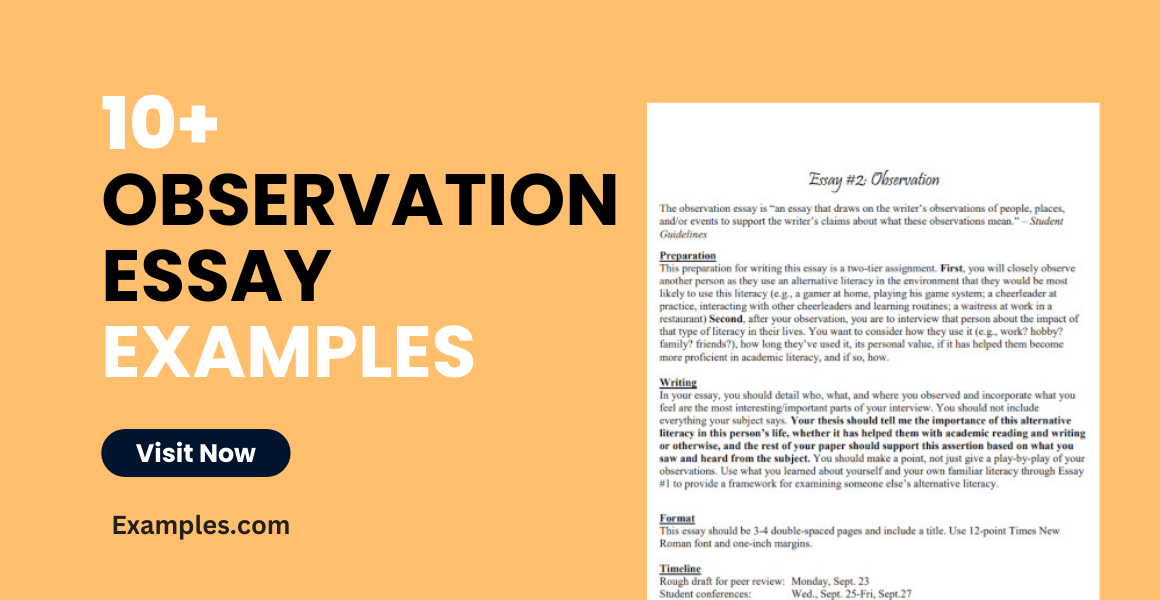
To properly observe something, you need to make use of all your five senses. Paying attention to all the details and being level-headed is a must. That said, a lot of effort goes into the act of observing something. The data gathered in your observation, whatever it may be, is necessary. Therefore you should write an observation essay and share your findings with the readers.
10+ Observation Essay Examples
1. writers observation essay.
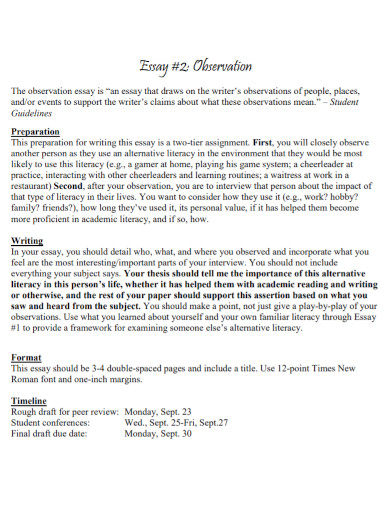
Size: 25 KB
2. Essay on Observation Theme
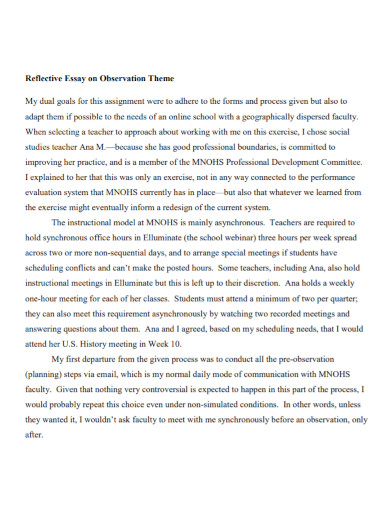
Size: 70 KB
3. Alternative Observation Essay
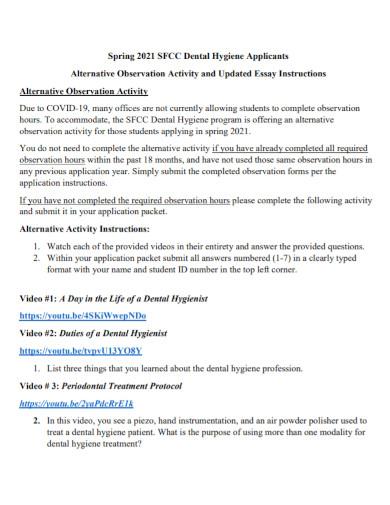
Size: 11 KB
4. Observation Essay Template
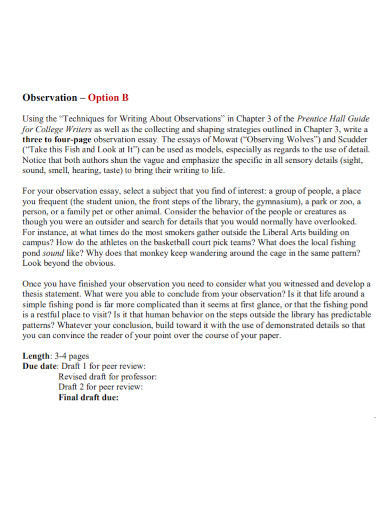
Size: 74 KB
5. Participant Observation Essay
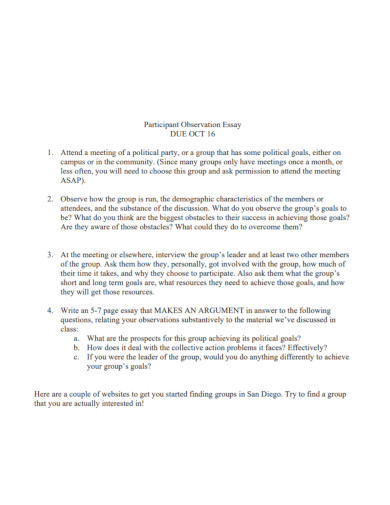
6. Narrative Teaching Observation Essay
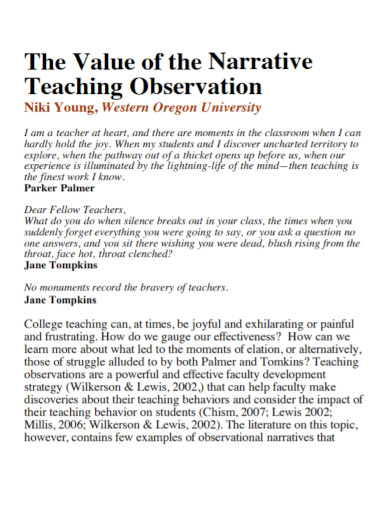
Size: 107 KB
7. Rehearsal Observation Essay
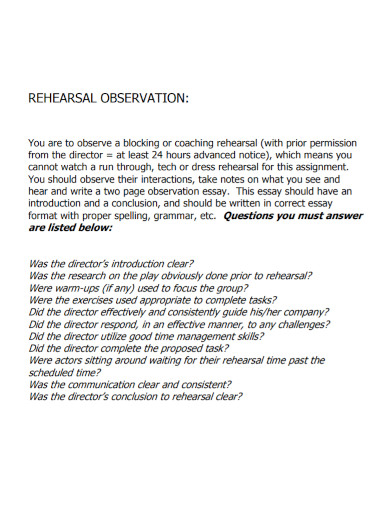
Size: 80 KB
8. Earth Observation Student Essay
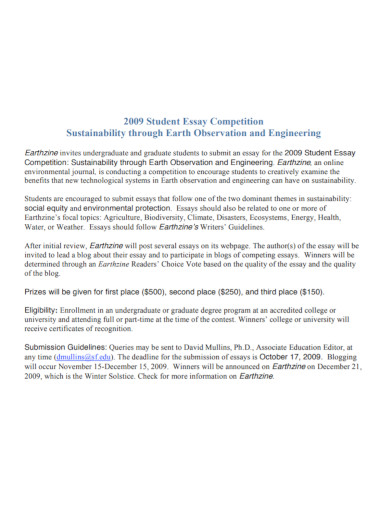
Size: 103 KB
9. Clinical Observation Reflection Essay
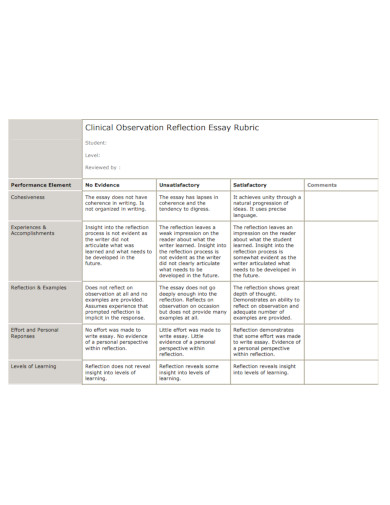
Size: 28 KB
10. Basic Observation Essay
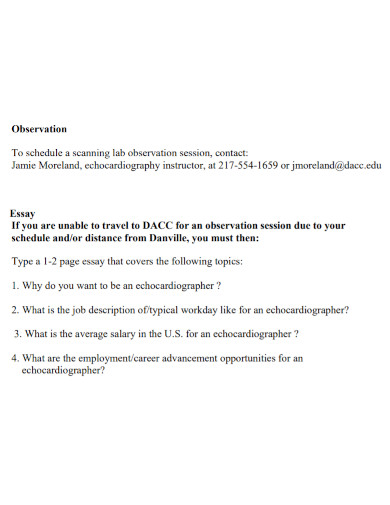
Size: 30 KB
11. Classroom Observation Essay
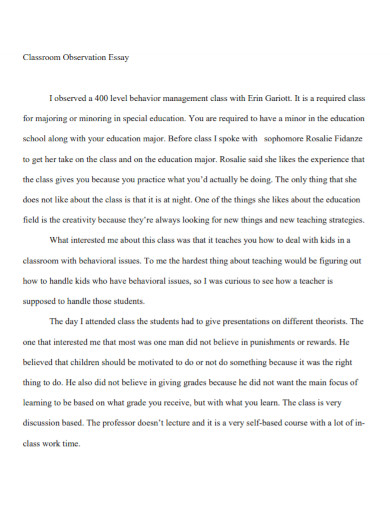
What Is an Observation Essay?
An observation essay is a piece of academic essay that incorporates the observer’s perspective over a situation, event, behavior, phenomenon, and even a person. In this document, the writer should state everything he or she directly noticed on the subject. In addition, they can also use first-person narration in this paper.
How to Write a Well-Versed Observation Essay
Whether you are a student writing an essay of your observation for a school assignment or educational research , or maybe a professional conducting a business analysis , you should compose it critically. The findings you present in your observation essay could be necessary to your field or industry. To keep it professional and informative, incorporate appropriate elements and organize it properly.
1. Follow Guidelines
If there are guidelines provided, ensure to read them beforehand. The list usually includes instructions regarding the format, the length, essential questions, the structure, and the deadline. To avoid forgetting the items to remember, you can secure a checklist beforehand. These details will act as your guide and will set the limits for your essay writing .
2. Devise an Outline
Considering that you already finished observing, take out your notes, and start constructing your outline. Consider basing its structure on the guidelines. You should decide what information goes on in a particular paragraph and organize it to be comprehensive to the general readers. You can save your energy by researching sample blank outline templates online instead of starting from scratch.
3. Compose Your Thesis Statement
Write your thesis statement in your introduction. After writing your hook and engaging your readers, it is now time to state what the essay will discuss. What did you observe? What are the general idea and nature of your essay? Your thesis statement will act as the central idea of your descriptive writing. Its length must only be one sentence.
4. Close With a Detailed Conclusion
After presenting the main ideas and supporting your claims, you should provide a conclusion statement that would sum it all up. In the last paragraph, you should restate the thesis statement and explain how all of these ideas are relevant to each other. Your conclusion should link back to the idea in your introduction.
How do you observe something properly?
The practice of observing is necessary for writing field reports of studies, especially in science and psychology. When you do an observation of something, it is advisable to research the subject you are studying. Also, you need to focus on your visual and hearing senses and your thought process. Avoid or get rid of factors that can distract you.
What are the different methods of observing?
The various methods of observing are categorized based on the level of involvement of the observer with the subject. If an observer is not noticed or personally seen by the participants, then he or she is employing the complete observer method. On the other hand, if the subjects recognize and interact with the observer, the implemented method is observer as participant.
How should you note your observations?
The first step in taking field notes of your observation is, write down the necessary details of the subject. Also, you should include the time and place. In writing your findings, you should stay objective and factual. Also, don’t forget to write a description of the setting and the materials involved.
The readers of your observation essay are not present at the time you did your observation. An observation essay is effective if its content is enough to supply information that would make the readers feel as if they are personally present at that time. Secure an observation essay, and earn an award certificate from your school or your work.
Text prompt
- Instructive
- Professional
Discuss the behavior of animals at a zoo and what it reveals about them in your Observation Essay.
Reflect on the atmosphere of a music concert you attended in your Observation Essay.
- Assignment Help
- Buy a Research Paper
- Buy an Essay
- Complete Coursework for Me
- Custom Essay Writing
- Write My Essay
- Write My Thesis
- Dissertation Writing Services
- Book Reports Online
- Essay Writing Service
- Cheap Essay Writing Service
- College Essay Writing Service
- Research Paper Writing Service
- Research Paper Help
- Assignment Writing Service
- Coursework Writing Service
- Coursework Help
- Statistics Homework Help
- Write My Research Paper
- Term Paper Writing Service
- Buy Coursework
- Thesis Editing Services
- Custom Thesis Writing Service
- Thesis Writing Help
- Buy Thesis Paper
- How we work
- Testimonials
- Contact Us 24/7 1-305-529-3642 My account

How to write an observation essay: Detailed Instructions
Over the course of your academic study, you will be given many different assignments, one of which may turn out to be an observational essay. We will tell you how to write an observational paper, and provide you with a few tips on how to make more engaging for the reader.
Answer the "What is an Observation Essay" Question
In reality, it is one of the easiest and the most interesting academic assignments. However, some students may get confused about the requirements for such an essay because they are used to writing analytical papers.
Useful Observation Essay Tips
Before we begin describing the structure, formatting and other aspects of an observation essay, we would like to give you some observation essay tips on how to make this essay stand out from the rest.
#1 Choose the object of observation that fascinates you. You wouldn't want to spend hours or even days observing something, or someone, whom you are not very fond of. If you were assigned the topic for the observation essay, try to focus on the point that may interest you and use it as a cornerstone for your description. For instance, if you were told to write an observation essay about the representative of a particular subculture such as street artists, while you are not fond of them as individuals, try to focus your observations on their artistic works, not their personalities.
#2 Use all your senses to create a more vivid picture of the things that you observe. Don't limit your observations to just looking at things or people. Try to touch these things, smell or even taste them; engage in a prolonged conversation with people whom you are observing, find out more about their personalities and then watch their behavior while having a better understanding of their inner world. It will help you get an entirely different perspective on the object or the subject and make your observation essay much more vivid and engaging.
#3 Try to apply present tence. This way you will allow the readers to perceive the events that you describe in the essay as if they are unfolding right before them, thus improving the engagement and the interest in the depicted event or object.
Observation essay structure: Coherent and well-grounded
Being asked to write such an academic paper many students get slightly confused because they are not really sure about how to structure an observation essay. They think that since it doesn't require the traditional set of academic writing skills, the structuring should also be unconventional. In reality, the structure of an observation essay is not different from the format of any other academic paper. It must have the following parts:
- Introduction
If you don't know how to start an observation essay, well, the answer is quite obvious: start it with the introduction. It is the part where the author has to get the reader acquainted with the object or the event that he or she intends to describe in the essay. This introduction should be succinct but informative, not drawing the reader's focus from the actual observation process.
You must never forget that the observation essay introduction must also include a thesis statement. However, unlike other essays, the thesis statement in an observation essay shouldn't support or deny any arguments or contain any strong statements for that matter. It would be sufficient to say why this observation is important for your field of academic study and what methods you used when conducting it.
Just like in any other academic paper, the observation essay includes from one to five paragraphs. Each of those should be logically connected with each other and form a complete picture of an event or an object that you have been describing. Try to put as much information as possible in each paragraph and make your description vivid and detailed. Don't just limit yourself to describing the overall appearance of the object or the things that happened during the event. Write about what you feel when you make the observations. Look for details which are not apparent for the ordinary viewer.
In your observation essay conclusion, you must rephrase and restate your thesis statement and then describe your overall impression regarding the process of observation and the event or the subject that you have been observing. Again, there is no need to make any strong statements, just tell the reader that you enjoyed making an observation. Basically, that is all you need to know about how to end an observation essay.
Observation essay format styles
In most cases, observation essays are written using MLA as it is the most popular and the most appropriate formatting style for this writing assignment. However, your teacher may ask you to prepare the paper applying APA or Chicago style for your observation essay format. Nevertheless, it shouldn't pose a problem since observation essays don't require plenty of quoting and references.
Observation essay outline: See the structure clearly
Frequently, you will be asked to write an outline for observation essay. In case you don't know how to do it appropriately, we will gladly provide a good example of the observation essay outline.
- Observation of human behavior during protests
- The behavior of people may change radically during different stages of protest
- How I joined the protest event called Occupy Wall Street
- How people behaved at the initial stages of the protest
- How their behavior changed when they confronted the representative of a large trading firm
- How passers-by reacted to the protesters
- The thoughts about the overall experience
- What make people so agitated when they participate in protests
- The Main Observation Essay Peculiarities to Observe
- Writing an Observation Essay Made Easy

Definition & Goals
Paper structure, introduction, body paragraphs, observation paper writing tips.
- Observation Essay Topics
Help with Observation Essay
Global Education Monitoring Report by UNESCO states that the total youth literacy rate in Egypt is 63. How did the organization come up with this conclusion? The answer to this question is observational statistics .
If you want to learn how to write an observation essay, you should know how to carry out the research. This article will provide you with some good topics for an observation essay, its definition, tips on writing, and a vision of this paper’s structure. As another option you can always ask a professional essay writer for help!
To define, an observation essay is a paper based on remarks and findings of an individual, group of people, or a specific event . The goal is to describe your observations on a particular theme using many details. Remember that it is not a research paper.
Write your observation essay in the present tense , creating an impression of keeping in touch with the event as if the reader was in the described place or writer’s reality. Sharing feelings and pointing out the notes on the event make the paper more realistic and engaging.
If your instructions do not specify the writing style, choose out of the available formats accepted in any college or university: MLA, APA, Chicago/Turabian, AMA, Harvard or ASA format essay . The choice depends on the academic level and field of study. Select a style with the most formal structure. The majority of writing formats contain the following elements:
- Title/Cover page
- Indents requirements
- Page numbers
- Bibliography page
As for technical requirements, composing an observation essay, the author needs to write in the first person . Such an essay’s structure is usually similar to the other essays: introduction, body paragraphs, and conclusion.
A decent introduction consists of a hook, background information, and a thesis statement. An essay hook is a sentence or two aimed at catching the reader’s attention to persuade them to carry on reading. Use a subtle joke, informative statistics, exciting facts, or a challenging question, and the reader will more likely proceed reading the rest of your essay.
Make sure to visit our blog on how to write a hook for an essay to create an irresistible opinion essay introduction.
Provided background information will create a total understanding of what the paper is about. The reader will be able to catch the main idea and the content of such a text. The author should be concise and not reveal too many details in the introduction.
The thesis statement most often is a 2-clauses sentence that highlights the main idea of the text. It raises questions and prepares the reader for its development in body paragraphs. The thesis in an observation essay could be a general impression from a subject of observations.
Traditionally, there’s no absolute measurement of how long your text should be. But generally, such a type of paper consists of 3-5 body paragraphs . However, don’t hesitate to specify the amount with your tutor.
Body paragraphs are given to you for disclosing the topic , i.e., developing the thesis statement, providing the reader with arguments and facts on the pros and cons of certain ideas. Writing an observation essay, you can use more figurative language to make your text more immersive.
Also, an observation essay’s purpose requires the writer to use the first person while writing.
The last part of your essay ‒ which usually is 1 paragraph ‒ is the easiest to perform. In conclusion, you need to analyze how you developed the thesis statement, provide the shortest ever overview of your arguments and ideas, and finish the text in a way that makes the reader think of it. Are you looking for an essay conclusion template ? Read our guide.
Writing an observation essay, you should be more attentive to details: mark how a particular journalist or professional writer plans and structures the recent articles discussing the current events. Daily news events could play a role of an excellent observation essay example to study.
Let’s review some of the tips regarding an observation essay:
- Write an observation essay outline if you are stuck with no idea how to start. Include the details like the number of paragraphs, specify headings, create a thesis statement, highlight main points and issues to cover. It is always a good idea to break down your task into pieces when working on the essay template .
- Write down three to five good ideas that you will try to defend in your work on a separate paper sheet. Every page must contain the sound, smell, touch, image, and taste of the chosen subject. Keep in mind that you’re not writing a descriptive essay.
- Present the scene, theme, and mood of the observation essay in your introduction. The scenery will be a good fit as the hook for your reader from the opening lines.
- Fill the body paragraphs with numerous observational details and evidence to support the main argument. Feel free to use figurative language as you need to immerse a reader into your view on the subject. But be attentive while writing, not to fall into descriptive essay examples .
- End your observational writing with a conclusion that leaves a powerful impression on a reader. Reflect on the paper’s thesis statement, list the main arguments and reasons for the further discussion of the subject, and provide some forecasts.
- Use personal experience to meet the paper’s criteria. Working on data & facts shared by other people does not make a legitimate observation essay.
- In case you use quotations, devote the last page to references . List all the cited works with the rights reserved to make your text free of plagiarism and avoid potential problems with intellectual property.
Observation Essay Topics
The list of observation essay topics can be endless – choose the one carefully based on the latest events in the cinematography, literature, music, or entire world. Read through the checklist on how to select a topic for an observation essay:
- Stick to the topic that excites you . Why spend your life on things that make you unhappy when there’s an option to avoid them? Moreover, the final text will be way more attractive for readers if you fill it with your interest in the topic.
- Do a little research . It is crucial to choose the most appropriate angle of your paper. The research will also help you to narrow your topic down and make it more informative.
- Write about familiar things . It is easy to make your paper inappropriate if you try to present a new topic while writing.
- Observe the recent news in different human activity fields to create a list of great topics on a separate page.
- Attend an event to get inspired . Include such details as who attended the event, why people organized that event, the meeting’s goals and place, and how it enriched your personal/professional experience.
If you still encounter difficulties with the choice, take a look at the shortlist of good observation essay topics to pick the best writing idea:
- Why do I find punctuality important?
- The movie I never get tired to re-watch
- Do I value honor more than material goods?
- Three simple ways to get rid of the depression
- Music is the best therapy in many life situations
- What sort of gift I believe is the best for my mom?
- The way we behave is the mirror of our personality
- The role of freedom in the life of the average American citizen
Congratulations on completing reading an ultimate guide on how to write an observation essay. In case you feel you lack writing experience or have some questions regarding your writing assignment be it an observation essay, a synthesis paper or an exploratory essay , feel free to get help from the professionals without leaving your home! Keep in mind that our writing services are at your disposal round the clock. Contact us, place your order, get a perfect paper, and make the best impression on your teacher and classmates!
Informative essay writing is not as simple as it might seem. You should inform the readers about the peculiarities of the topic. However, it should be done in a bias and opinion free manner. To master the art of informative essay writing, read the article. In it you will find writing tips, see a wel...
An effective rhetorical text should pull strings. When composing a rhetorical analysis essay, an essay writer should recognize these strings and explore what makes the text convincing. While most students care about the reader's involvement, none of that works if textual analysis lacks critical aspe...
Being proficient at writing essay hooks is a vital skill to master for students in academic writing. It will be harder to make your readers get excited to read your essays without it. Suppose that you have produced some reliable content to present. Still, if you miss using a strong attention grabber...
- How It Works
- Essay Examples
Observation Essay Writing Tips & Topics
Just as the above quote emphasizes, listening and observing are two key factors for gaining new information and add to your personal experience. This can be easily applied to writing observation essays, for example. Observation, inference and fact are the three concepts every student that wants to write a good observation essay has to memorize. The ability to write a good observation essay makes the difference between a writer and a true wizard of words. And in order to achieve such a state you need to make use of all the senses available to you:
If the goal of your essay is to leave an unforgettable mark on the memory of the reader, you can easily achieve that through buying personalized academic papers from a top writing company in the United States.
Outlining Example of an Observation Essay
Continue reading the below guidelines in order to have an example of an outline for any observation essay.
Personal Experience
There’s nothing better to help you describe a situation than going through such an experience yourself. The connection between your personal experience and the subject of your observation essay has to be at a high level in order to be able to share that certain experience with others. That’s why you first need to choose carefully the topic of the essay you’re going to cover.
For Example : when you decide to write an essay on how thrilling downhill biking is, mentioning a handful of statistics and details about how it gets your adrenaline pumping. If you never got on a bike and ride your way down a forest road, you won’t be able to share that experience with others. If you want to support your claim, you must always write from experience. Go to the stadium before writing a piece on a local football team or listen to the entire album before reviewing it.
Taking notes is a vital part of sharing experience, that’s why you will always need to have a good method of writing things down or record them. From the recorded info, you can start writing the first draft of the essay. Make sure to capture the whole process: from going through the security checks, finding your seat, how did the game make you feel, all the way to how it felt being surrounded by all those angry fans that their team just lost. Make sure to also include all your impressions here and also pick some criteria to rate: atmosphere, utilities at the stadium, security lever, etc.
Every time your personal intake of things suffers a modification, make notes about what the change was and when did it happen. Keeping a chronological order of events will help you to reconstruct the journey in the essay. In order to have a complete view on things, take some notes of a friend’s opinion that went with you or ask a supporter sitting next to you about his experience.
Create a Sketch
An outline or sketch is very important to keep your paper logical and structured This is very useful in case you ever get stuck or lost while reconstructing the essay. You may change your final draft, but you must stick to the prepared outline. If your teacher requires, make a separate page with a detailed outline. In case you encounter any kind of issues when writing the outline or any other part of your essay, never hesitate to access professional writing services .
Introduction
Here’s where you should give your audience the opportunity to catch a glimpse of what they’re about to read in the rest of the article. Start with a thesis statement that will serve as the essay’s fundament. Then create a catch sentence to get the attention of your readers. You can also give them some insight into the reason you chose that specific observation topic.
Three-Paragraph Body
The body of the observation essay has the same structure as any other assignment. The most used structure and what experts recommend is having a three-paragraph body with support arguments. The next step is arranging your notes according to the previously-prepared outline on which you will add the details Keep in mind:
“Details create the big picture." Sanford I. Weil
You need to keep this section as simple and straight-forward as possible.Instead, to a summary of your arguments, appeal again to your thesis sentence and then use a call-to-action to finish the paper in such a manner that it will leave a strong impression. A rhetorical action is perfect at the end of your paper. You might think you’re done but you still have one more page to write. This final page of your observation essay must be a complete bibliography where you write down all your sources and references.
Editing and Proofreading
Finishing the actual paper doesn’t mean you’re done with everything. Before submitting your paper, you need to do some proofreading. Naturally, this can’t be done by you as the subjectivism can affect the results. Instead, you should ask someone else to do that for you. Or you can just place an order with an online writing and proofreading service , that assists college students all-round the English-speaking world!
They will be able to assist you with very important aspects regarding your observation essay like:
- Grammar mistakes
- Punctuation and Spelling
15 Examples of Observation Essay Topics
In order to write a high-quality observation essay, students need to possess other two skills. Organization skills and a rich vocabulary are the skills needed. Remember, your goal is not to deliver a message but share your experience with the audience. with your audience. That’s why it is very important to carefully choose your topic. If you need some inspiration, check out some free, useful examples of observation essays.
You can use this list of 16 topics as a starting idea for your essay:
- Important aspects of tattoo and body piercing
- How is important tolerance?
- Can death result from video games?
- The importance of independence and freedom
- The Modern World and the meaning of money
- Leadership developed through sports
- Meeting my favourite Rockstar
- The thrills of downhill biking
- Books appropriate for any age
- New club in the city
- Buying the perfect wedding or birthday gift
- The definition of “loyalty”
- Healing through music, myth or fact?
- Achieving success through writing
- The personality traits of personal idols
- College is too expensive essay
Some Useful Tips for Observation Essay Writing
- Don’t forget the personal touch. Allowing the audience to add your experience to theirs and identifying with it is your main goal.
- Always have something to take notes on. The importance of putting the events on paper as fresh as possible is of extreme importance.
- Avoid using a lot of unnecessary words just to make your essay longer. If you manage to reduce the amount of transitional & introductory words in your essay, you will get a lot more clear topic and thesis statement.
- Always appeal to personal experience by using the situations you faced during your entire life. It helps the readers to identify themselves with you or, at least, to know you better.
- The descriptive narrative and the observation essay have a lot in common so feel free to use the human senses. Try to provoke a reaction that appeals to one of these five during your essay.
- Remain objective at all times.
- Don’t forget about the Bibliography at the end.
- You should know what does proofreading mean .
Keep in mind: you can always emphasize the importance of the selected topic by sharing personal lessons learned. If at any time, you need any help with the essay itself or with proofreading and editing it, you can always order online academic guidance from a trustworthy company.

- How to Write the Common Application Essays
- How To Write an Argumentative Essay
- What Response Essays Are and How to Tackle Them
- How To Write a Term Paper
- Resume Writing Tips

Questions? Call us:
Email:
- How it works
- Testimonials
Essay Writing
- Essay service
- Essay writers
- College essay service
- Write my essay
- Pay for essay
- Essay topics
Term Paper Writing
- Term paper service
- Buy term papers
- Term paper help
- Term paper writers
- College term papers
- Write my term paper
- Pay for term paper
- Term paper topic
Research Paper Writing
- Research paper service
- Buy research paper
- Research paper help
- Research paper writers
- College research papers
- Write my research paper
- Pay for research paper
- Research paper topics
Dissertation Writing
- Dissertation service
- Buy dissertation
- Dissertation help
- Dissertation writers
- College thesis
- Write my dissertation
- Pay for dissertation
- Dissertation topics
Other Services
- Custom writing services
- Speech writing service
- Movie review writing
- Editing service
- Assignment writing
- Article writing service
- Book report writing
- Book review writing
Popular request:
How to write an observation essay answer’s here.
February 20, 2020

Struggling to write your first ever observation essay? If this is the case, you definitely need our help! In this blog post, we will explain what this academic paper is, how to get a good example, and how to write the essay quickly using an easy-to-understand structure. It doesn’t matter if you are tasked by your professor with writing a courtroom observation essay or a child development observation essay.
Just follow our advice and you’ll do a wonderful job. Of course, it goes without saying that you need to do the research yourself, even if it’s just a classroom observation essay you have to write.
What Is an Observation Essay?
Let’s start with the beginning. What is an observation essay? The simple answer is that it is just a piece of direct investigation. You need to observe something (an event, a person, a situation, a concept, or even an area) and then describe it as meticulously as possible. However, things tend to get a bit complicated when it comes to actually writing the paper. Why?
Because even when writing a seemingly simple child observation essay, you need to describe everything as vividly as possible. You need to provide a sensory experience to the reader, which is by no means an easy thing to do. Your observational skills and attention will be put to the test, and so will your observation essay writing skills.
Need an Observation Essay Example?
You probably don’t know much about observational writing. And this is precisely why you need the best observation essay example you can find. Don’t be afraid to contact an academic writing company for one. Even if you’ll have to pay a couple of dollars for a top quality example, this is money well spent. Here is why observation essay examples really matter:
- You will see exactly how a professional writer describes every small detail. Providing a detailed sensory experience to your readers can be difficult without a good example.
- You get to see how such an academic paper is structured. Yes, you can use the same structure for anything, including a preschool observation essay.
- You can quickly understand what you need to pay attention to. You will also probably learn that using first-person singular pronouns is frowned upon in academic writing.
- You will learn how to paint a picture with your words. You’ll learn how to engage all of your audience’s senses by describing smells, colors, sounds, shapes, and even images.
Examples of Nice Observation Essay Topics
Reading even one excellently written children observation essay can greatly improve your odds of getting an A+ or at least an A. However, keep in mind that the observation essay topics you choose also have a great impact. The topic and the thesis statement are usually the first thing your professor sees. Capture his or her attention from the first second and you’ll most definitely get some bonus points. To help you out as much as possible, here are some topics that we consider excellent for 2020:
- Here is why I admire my math teacher the most. (this is a great observation essay on a person)
- Why do children hate school so much?
- What does money mean to us?
- I just found a new restaurant in the city.
- Treating arthritis with geriatric physical therapy. (a fine choice for a physical therapy observation essay)
- Do video games really change our behavior?
- Let’s talk about the recent baseball game.
- How does bullying affect its victims?
- Are animals at the Zoo sad? (excellent choice for a naturalistic observation essay)
How to Write an Observation Essay in 5 Paragraphs?
Of course, you can write about anything you like – if your professor has not assigned you a specific topic. But how do you write an early childhood observation essay the right way? Learning how to start an observation essay can make the difference between working on the paper for 4 days and finishing it in just 2. Here is how you write an observation essay in just 5 paragraphs:
- The introduction. You need to introduce the topic and provide a bit of background information about it. Also, don’t forget to include the thesis statement in the first or second phrase. Alternatively, open your intro with a peculiar fact or an anecdote and include the thesis statement afterwards.
- Three body paragraphs. Remember, all your observations should be vividly described in just 3 paragraphs. Yes, even if you’re writing a preschool child observation essay. Each paragraph should cover one main supporting argument. Focus the entire paragraph on just one important observation and describe it to your readers as best as possible.
- The conclusion. You don’t need a lengthy final paragraph. The body paragraphs already described the subject in great detail. The background information has been included in the introduction. The conclusion should restate your thesis statement, followed by a summary of the three important points you’ve discussed in the body of the paper. Wrap everything up with a call to action and the essay is done!
Well, not exactly done; you still need to edit your work and proofread it thoroughly. Why risk getting a lower grade just because of a couple of typos? Make sure your infant toddler observation essay is written perfectly and you will get a very good grade for your hard work.
Pro Tip: Use an Observation Essay Outline
Now you know why an example is good for you and you also know how to write an observation essay quickly. To wrap everything up, we want to tell you about the one thing that will help you immensely. When it comes to writing an observation essay, there is nothing better than a good essay outline. Really, an outline will prove invaluable regardless of the topic you are writing about (including a daycare observation essay).
But how do you create an exceptional observation essay outline? To write the essay, you will need to carefully observe the subject. You will, of course, take extensive notes during the observation period. To create the observation essay outline, you just need to organize your notes and find the most important aspects you wish to talk about. Keep in mind that an outline is quite similar to a table of contents. It’s the skeleton upon which you build your observation essay. It goes without saying that writing such a complex paper without a good outline won’t end well for the student who attempts it.
Read a good example, find an intriguing topic, start your writing with an outline, and make effective us of the five paragraph essay. That’s all you need to write an observation essay worthy of an A+.

Take a break from writing.
Top academic experts are here for you.
- How To Write An Autobiography Guideline And Useful Advice
- 182 Best Classification Essay Topics To Learn And Write About
- How To Manage Stress In College: Top Practical Tips
- How To Write A Narrative Essay: Definition, Tips, And A Step-by-Step Guide
- How To Write Article Review Like Professional
- Great Problem Solution Essay Topics
- Creating Best Stanford Roommate Essay
- Costco Essay – Best Writing Guide
- How To Quote A Dialogue
- Wonderful Expository Essay Topics
- Research Paper Topics For 2020
- Interesting Persuasive Essay Topics
📕 Studying HQ
How to start an observation essay for nursing students: a complete guide, carla johnson.
- October 5, 2023
- How to Guides
Observation essays are a valuable tool for nursing students to develop their clinical skills and enhance their ability to communicate their findings effectively. These essays require students to observe and reflect on real-life patient interactions and experiences carefully. Through this article, we will provide a step-by-step guide on how to start an observation essay. Whether you are new to this assignment or seeking to improve your skills, this comprehensive guide will assist you in crafting a compelling and insightful essay.
What You'll Learn
Understanding the Purpose of an Observation Essay
Before diving into the practical aspects, it’s essential to grasp the purpose of an observation essay in nursing education. These essays serve several key objectives:
- Developing Observation Skills: Observation essays train students to become keen observers of patient behavior, symptoms, and healthcare interactions.
- Critical Thinking and Reflection: They encourage critical thinking by requiring students to analyze and reflect on their observations, leading to a deeper understanding of patient care .
- Effective Communication: Writing an observation essay helps nursing students practice communicating their findings, a vital skill for healthcare professionals.
- Personal Growth: These essays foster personal and professional growth by promoting empathy, compassion, and a holistic approach to patient care.
Choosing Your Observation Setting
Selecting the right setting for your observation essay is crucial. Consider the following factors when making your choice:
- Clinical Placement: Often, observation essays are based on experiences during clinical placements. Choose a clinical setting that aligns with your learning objectives and interests.
- Informed Consent: Ensure that patients or individuals involved in your observation have given informed consent. Respect their privacy and confidentiality .
- Diversity of Cases: To gain a well-rounded perspective, aim to observe a variety of patient cases, from different age groups, conditions, and healthcare settings.
Observing with Purpose
Effective observation is the cornerstone of a successful observation essay. Here are some tips to guide your observations:
- Prepare Beforehand: Familiarize yourself with the patient’s medical history , condition, and treatment plan. This background knowledge will help you focus on relevant details during your observation.
- Use a Structured Approach: Create a checklist or template to ensure you cover key aspects during your observation. Include sections for patient behavior, healthcare team interactions, and environmental factors.
- Take Detailed Notes: During your observation, take clear and concise notes. Include specific actions, conversations, body language, and any other relevant information.
- Stay Objective: Strive to maintain objectivity during your observation. Avoid making assumptions or judgments based on your personal beliefs or biases.
Structuring Your Observation Essay
Now that you have gathered your observations, it’s time to structure your essay effectively. A well-structured essay makes it easier for readers to follow your narrative:
- Introduction: Begin with a captivating introduction that sets the stage for your observation. Briefly introduce the patient, the clinical setting, and the purpose of your essay.
- Patient Background: Provide essential information about the patient, including their age, gender, medical history, and reason for being in the healthcare setting.
- Observation Narrative: This is the heart of your essay. Organize your observations in a chronological or thematic order. Describe the patient’s behavior, interactions with healthcare providers , and any significant events or changes you noticed.
- Reflection: After presenting your observations, reflect on what you witnessed. Discuss the implications of the observed behaviors and interactions, and how they relate to the patient’s care or the healthcare system in general.
- Lessons Learned: Share any valuable insights, lessons, or new perspectives you gained from the observation. Reflect on how this experience has contributed to your growth as a nursing student.
Writing Style and Tone
Maintaining a suitable writing style and tone is essential in nursing observation essays:
- Clarity: Write in a clear and concise manner. Avoid jargon and ensure a wide audience easily understands your descriptions.
- Professionalism: Maintain a professional tone throughout your essay. Use appropriate language and terminology.
- Empathy: Show empathy and respect for the patient and healthcare providers in your narrative. Highlight the human aspects of healthcare.
Proofreading and Editing
Before submitting your observation essay, take the time to proofread and edit it thoroughly. Check for the following:
- Grammar and Spelling: Correct any grammatical and spelling errors. Use a grammar-checking tool or seek assistance from a peer if needed.
- Clarity and Flow: Ensure your essay flows smoothly from one section to another. Verify that your ideas are presented logically.
- Citations and References: If you use any external sources, make sure to cite them correctly in your chosen citation style (e.g., APA, MLA).
Writing an observation essay as a nursing student can be a challenging yet rewarding experience. It enhances your observation skills and contributes to your growth as a healthcare professional. You can create a well-structured, insightful, and impactful observation essay by following the steps and guidelines outlined in this comprehensive guide.
If you find yourself struggling with writing your observation essay or any other academic assignment, remember that assistance is available. Our professional writing services are here to support you in your academic journey. Contact us today to receive expert guidance and ensure your essays are of the highest quality. Your success is our priority, and we are committed to helping you excel in your nursing education.
1. How do you introduce an observation?
- To introduce an observation, begin with a brief description of the setting, context, and the subject of your observation. Clearly state the purpose of your observation in a concise and engaging manner to capture the reader’s attention.
2. How do you write an observation essay sample?
- Start by selecting a specific observation experience. Then, follow a structured approach by providing background information on the subject, describing your observations in detail, reflecting on your findings, and concluding with key takeaways and insights.
3. What is an example of a statement of observation?
- An example of a statement of observation could be: “During my clinical rotation in the pediatric ward, I observed a 5-year-old patient exhibiting signs of distress, including rapid breathing and restlessness, while waiting for a medical examination.”
4. What is the structure of an observation essay?
- The structure of an observation essay typically consists of an introduction, patient background information, a narrative of your observations, a reflective section, and a conclusion. This structure allows for a clear and organized presentation of your observations and insights.
Start by filling this short order form order.studyinghq.com
And then follow the progressive flow.
Having an issue, chat with us here
Cathy, CS.
New Concept ? Let a subject expert write your paper for You
Have a subject expert write for you now, have a subject expert finish your paper for you, edit my paper for me, have an expert write your dissertation's chapter, popular topics.
Business StudyingHq Essay Topics and Ideas How to Guides Nursing
- Nursing Solutions
- Study Guides
- Free College Essay Examples
- Privacy Policy
- Writing Service
- Discounts / Offers
Study Hub:
- Studying Blog
- Topic Ideas
- Business Studying
- Nursing Studying
- Literature and English Studying
Writing Tools
- Citation Generator
- Topic Generator
- Paraphrasing Tool
- Conclusion Maker
- Research Title Generator
- Thesis Statement Generator
- Summarizing Tool
- Terms and Conditions
- Confidentiality Policy
- Cookies Policy
- Refund and Revision Policy
Our samples and other types of content are meant for research and reference purposes only. We are strongly against plagiarism and academic dishonesty.
Contact Us:
📞 +15512677917
2012-2024 © studyinghq.com. All rights reserved

Observation Essay: Example and Tips

If you want to leave an unforgettable impression on the reader, when writing an observation essay, you might need experience of experts. Read the article below to learn how to write an observation essay and see examples of all three parts of the essay.
What are the features and qualities, which differ observation essay from other types of essays? Observation essay is close to the narrative one with the mandatory element: the author must tell about his personal experience. In the observation essay, it is not enough to write statistical data and facts borrowed from other sources. Author must reflect his thoughts, events of his life or observations he made. Without that feature, the essay may not be considered an observation essay.
- 1 Example of topics for observation essays
- 2.1 Example of introduction to observation essay. Topic “How I left everything and started traveling”
- 3.1 Example of main part to observation essay
- 4.1 Example of observation essay conclusion
- 5 Final actions when writing observation essay
Example of topics for observation essays
- How I left everything and started traveling (used as example)
- Influence of videogames
- Does the music cure?
- Role of money in modern life
- How to become a leader?
- Success in sports equals success in life
- My reflection of the world around
- Work of a teacher as I see it
Writing introduction to observation essay
There are two possible cases connected with the choice of the topic. If the topic was given by the teacher, you have no need to explain it. But if the topic was open and you made the choice yourself, you need to substantiate why exactly this topic deserves your attention. Such an explanation may be a good introductory part of the observation essay.
Pay attention to the size of structural parts of the essay. Introduction of observation essay should take about 15-20 percent of the entire work. This amount of words must be enough to make the reader want to read your narration and know you better. Using a quote of a famous person may also be used as catchy element of the introduction.
This essay presents my true story about how I decided to leave everything and start traveling. How I argued with my parents and solved problems with the authorities. How an ordinary trip to Asia has become for me a symbol and solid soil, which helped me not change my mind and bring it to the end.
Example of introduction to observation essay. Topic “How I left everything and started traveling”
What to do when you want to quit everything and leave to travel? In the era of social networks, the Internet is full of appeals to quit everything and go to another city, country, to travel. There are many stories about people who left the family and went on a round-the-world trip to find themselves and their path.
In this essay, I do not want to condemn anyone, I do not want to talk about the correctness or wrongness of the decisions of people who abandoned everything. I will not talk about various financial opportunities and social inequality. I just want to tell you my story of escaping from the office.
The story began just like that:
– “When we get home, I’ll quit my job,” I told my friend.
– Come on.
– “I’m serious,” I said, and turned my face to the warm rays of the Thai sun.
Writing main part of observation essay
After laying the foundation of the story telling in the introduction, move on to the main part of observation essay. All the thoughts, events and ideas must be described in this structural unit. It is the biggest part in the amount of words and takes about 65 percent of the total volume of the paper.
In case of short observation essay, main body consists of three paragraphs, where the author presents three separate ideas. All of them should be confirmed. The main rule of writing the body of observation essay is that it should be personal and based on personal experience of the author.
Example of main part to observation essay
It was the year 2004, and we spent a vocation on Koh Samui. We just arrived from Chiang Mai, where I met five travelers who inspired me to a nomadic life. I was under the strongest impression of their way of life. No stuffy offices and gossiping colleagues, no traffic jams and boss, is not it a fairy tale? I wanted to live like that. Moreover, I seriously intended to change my life. I even began to prepare for this serious step while still in Thailand, although I had no idea what to do and where to start.
While we were relaxing at the beaches of Koh Samui, I bought a guidebook from Lonely Planet in Southeast Asia. Then I did not even know where I wanted to go, from where on the map I decided to start my experience as a traveler, not as a tourist. I only knew that everything is cheap and it is warm in Asia. After buying the guidebook, my idea grew out of the rank of empty dreams into something more real. It was then that I suddenly realized that, in fact, I can really change my life. This thing played the role of a point of no return. Now the usual guidebook has become for me a symbol, confirming the firmness of my intentions.
I read every page in this little book when I got home. I marked out the place which I would like to visit, planed the routes, and already mentally gathered for the road. By the time our plane landed at JFK, I knew all about travels in Asia.
Nevertheless, after returning home, I realized that I have no idea how to turn my dream into reality. Thousands of questions swarmed through my head. How much money will I need? When can I afford such a long trip? What will my parents say? Do I need a return ticket? Which card is better to take with you? Is it safe to live in a hostel? The list of questions seemed endless, and in 2004, without numerous airplane ticket searchers, travel blogs, phone applications and other modern travel planning aids, it was somewhat more labor-intensive than it is now.
The hardest thing was to tell my family, friends and acquaintances that I was going on a long-term journey. I do not remember in detail the conversation that I had with my parents, but they took my decision quite coldly. By that time, they had become accustomed to my impulsive ideas, which were not uncommon but rarely turned into reality, and were ready to parry all my arguments fully armed. Their main argument was the statement that the world is a dangerous place and they will be very worried for me.
Since I had time in advance, I had enough time to drip on their brains. Nevertheless, I think that they did not believe in the seriousness of my intentions till the last moment and tried all the time to dissuade me. But once I’ve decided, I’ll bring it to life. I’m so stubborn.
Unlike the story with the parents, I remember the conversation with my boss to the smallest detail. It happened just a couple of months after my return from Thailand. During this time, I became more and more strengthened in the idea of abandoning everything and leaving to travel. I even got some confidence that I really could do it. I knew that I would leave.
On that memorable day, I went to the office of my boss, told him that I wanted to talk to him, sat in a chair opposite and announced my intention to leave work. After meeting and talking with travelers, I firmly decided to see the world before I seriously take up my career. This was my first job, and I worked there for only 8 months. He began to object to me, saying that it was difficult to find a suitable candidate for my post so quickly. To which I replied that I did not want to leave right now, and asked for another six months. I remember his incredulous tone, with which he asked me: “Are you sure?”. I said: “I’m sure” and at the same moment I felt that there was no turning back.
In a sense, that day, I left not only work but also the life that I could live. I betrayed the parent idea about my future, about a good career, family, home, car and all the other things that make up the concept of “successful life”. I almost physically felt my life slipping, and I was not ready for it. I then thought that maybe I made a mistake, perhaps, life is not so bad. But I knew that I was unhappy. In my 24 years, I worked 50 – 60 hours a week, saved up for a car and planned that the next 40 years of my life would be about the same. I never liked this way of life, but it’s the way all normal people live, right?
Writing conclusion part to observation essay
The word Conclusion itself suggests that the author’s aim here is to conclude and sum up everything that has been said in the previous parts of the observation essay. In the final part, ideas are generalized, while in the main part every particular one is described.
The volume of the conclusion in observation essay is about 15-20 percent of the total paper. It should be equal or a little bigger than the introductory part.
Read the example of conclusion of observation essay to get an idea of how it should be written.
Example of observation essay conclusion
My trip to Thailand has shown me that life is not only a corporate meat grinder from 9 to 20. If such a way of life fits most people, then I’m sincerely happy for them. On the day when I announced my boss my intention to leave, I saved myself from a way of life that I never truly loved. And so, when I finally could afford to go out on the big road in search of adventure in 25 years, I still was not ready for it. I twisted in my head the cowardly thought that upon returning home I will immediately return to “normal life”, but this did not happen. After a while, the gap between me and the business world became too great.
Sometimes the decisions that we make in life are transformed for us into a tsunami, which demolishes the whole old way. So, if you are tormented by the question of how to leave everything and start a new life, just make a decision and make at least some real step towards change. Such serious changes never happen quickly at the click of a finger, they mature for a long time in our minds, they require a lot of preparation time. Still, we live in a fairly inert reality. Having made the decision to leave work, I left not only the office, but also my old way of life. But in return I found my own path, one that pleased me and never regretted the decision I made.
Final actions when writing observation essay
The first thing you do when getting the task of writing observation essay, is choosing the topic. After that, you prepare the outline of the future paper and think of the content of each structural part: introduction, main part and conclusion.
When the writing is finished, the work of the author is not done yet. There comes the time for proofreading and editing. Experts recommend taking a several days break and only after that get back to work. Read attentively the observation essay and correct grammar and lexical mistakes. Check the paper for typos and useless meaningless information. Delete everything that does not change the overall picture of the observation essay.

Advertiser Disclosure
How we make money, what is an observation essay, our promise to you.
Founded in 2002, our company has been a trusted resource for readers seeking informative and engaging content. Our dedication to quality remains unwavering—and will never change. We follow a strict editorial policy , ensuring that our content is authored by highly qualified professionals and edited by subject matter experts. This guarantees that everything we publish is objective, accurate, and trustworthy.
Over the years, we've refined our approach to cover a wide range of topics, providing readers with reliable and practical advice to enhance their knowledge and skills. That's why millions of readers turn to us each year. Join us in celebrating the joy of learning, guided by standards you can trust.
Editorial Standards
At Language & Humanities, we are committed to creating content that you can trust. Our editorial process is designed to ensure that every piece of content we publish is accurate, reliable, and informative.
Our team of experienced writers and editors follows a strict set of guidelines to ensure the highest quality content. We conduct thorough research, fact-check all information, and rely on credible sources to back up our claims. Our content is reviewed by subject matter experts to ensure accuracy and clarity.
We believe in transparency and maintain editorial independence from our advertisers. Our team does not receive direct compensation from advertisers, allowing us to create unbiased content that prioritizes your interests.
An observation essay is a paper written after watching a person, group, or event. This essay is typically written in the first person as an account of historical events witnessed by the writer. It provides a detailed descriptive account of an event or activity and should include a detailed account of theme, mood, and scenery. The length of this essay varies, but is typically 1,500 or more words.
Observation essays have been used throughout history in many types of literature. These are stories that provide a first-hand account of an event. Many journalists use the observation essay format to report daily news events. This provides the reader with a descriptive account of the scene, which makes the story come to life.
An observation essay should be written in the present tense. It should provide details of feelings felt by the writer while he observed the event. These human experiences make the essay more understandable and realistic.

The opening paragraph of an observation essay should set the scene, theme, and mood for the paper. This paragraph should define the what, where, and when for the story. It is the opportunity to entice the reader with enchanting scenery and actions that grab the reader’s attention.
A critical theater review is an example of an observation essay based on a movie, show, or a theatrical play. This review is designed to inform the reader on the quality of play and characteristics of the show. This type of essay is designed to paint a picture of the general atmosphere and experiences felt by the crowd during the show.

A story that is written with the voice of a narrator is an example of an observation essay. In this type of first-person writing, the reader becomes the spectator of the story, watching the events unfold while he reads each word. This makes the story more compelling to read because it is based on events that were witnessed by the author.
An observation essay should including clear, descriptive language. The story should include details about what the writer felt while he was watching the event. This typically includes descriptions on the weather, smells, temperature, and colors found in each scene. No detail is too small in a observation essay because it makes the story more lifelike.
Related Articles
- What Is a Profile Essay?
- What Are the Different Types of Essays?
- What Is an Exemplification Essay?
- What is a Personal Essay?
- How can I Write a Strong Essay?
Discussion Comments
Language & humanities, in your inbox.
Our latest articles, guides, and more, delivered daily.
Everything to Know About How to Write an Observation Report

Welcome to The Knowledge Nest, your ultimate resource for all things related to observation report writing. In this comprehensive guide, we will provide you with valuable insights, tips, and techniques to help you excel in the art of writing an observation report. Whether you are a student, researcher, or professional, this guide is here to assist you in crafting impactful observation reports that leave a lasting impression.
Understanding the Importance of Observation Reports
Observation reports play a crucial role in various fields, including education, psychology, scientific research, and more. These reports allow individuals to document and analyze their observations, providing valuable insights and contributing to the overall knowledge base in their respective fields. Writing a well-structured, detailed, and insightful observation report is essential for effectively communicating your findings and ensuring their validity.
The Key Components of an Observation Report
Before we delve into the nitty-gritty details of writing an observation report, let's outline the key components that should be included in your report:
- Introduction: Begin your report by providing background information about the subject of your observation and the purpose of your study.
- Methodology: Explain the methods and techniques you used to conduct your observation, including any tools or equipment.
- Observation Process: Describe the setting, context, and timeline of your observation. Include relevant details such as the participants involved, location, and any other pertinent information.
- Observation Findings: Present your observations in a clear and organized manner. Use descriptive language and provide specific examples to support your findings.
- Analysis and Interpretation: Analyze the data gathered during your observation and provide interpretations based on your observations. This section should involve critical thinking and reflection.
- Conclusion and Recommendations: Summarize your findings, draw conclusions, and provide any recommendations for future research or actions.
- Appendices: Include any additional supporting materials, such as charts, graphs, or photographs, in this section.
Tips and Techniques for Writing an Effective Observation Report
Now that we have covered the essential components, let's dive into some valuable tips and techniques to help you write an effective observation report:
1. Choose an Appropriate Observation Method
There are various methods of conducting observations, such as participant observation, non-participant observation, structured observation, and unstructured observation. Select the method that aligns with your research objectives and the nature of your study.

2. Plan and Prepare
Prior to conducting your observation, create a detailed plan outlining the objectives, timeline, and any specific instructions or protocols. This will help ensure that your observation is well-organized and focused.
3. Be Objective and Unbiased
When conducting your observation, strive to remain objective and unbiased. Avoid making assumptions, and let the data speak for itself. Record your observations accurately and truthfully.
4. Use Descriptive Language
When documenting your observations, use descriptive language to paint a vivid picture for your readers. This will enhance the reader's understanding and provide a comprehensive view of the situation.
5. Include Relevant Details
Ensure that your observation report includes all relevant details, such as the date, time, location, and specific actions or behaviors observed. The more specific and detailed your report, the more valuable it will be.
6. Support Your Findings with Examples
Back up your observations with concrete examples and evidence. This will add credibility to your report and strengthen your arguments.
7. Reflect and Analyze
Take the time to reflect on your observations and analyze the data you have collected. Consider different perspectives and critically evaluate the significance of your findings.
8. Edit and Proofread
Before finalizing your observation report, thoroughly edit and proofread it for any grammatical errors, typos, or inconsistencies. A well-written and error-free report enhances its professionalism and credibility.
Crafting an exceptional observation report requires time, effort, and attention to detail. By following the techniques and tips outlined in this guide, you will be well-equipped to write comprehensive and compelling observation reports that contribute to your field of study. Remember, the key to a successful observation report lies in thorough observation, accurate documentation, and insightful analysis. Happy writing!

How the Human Resource Department Works in a Company
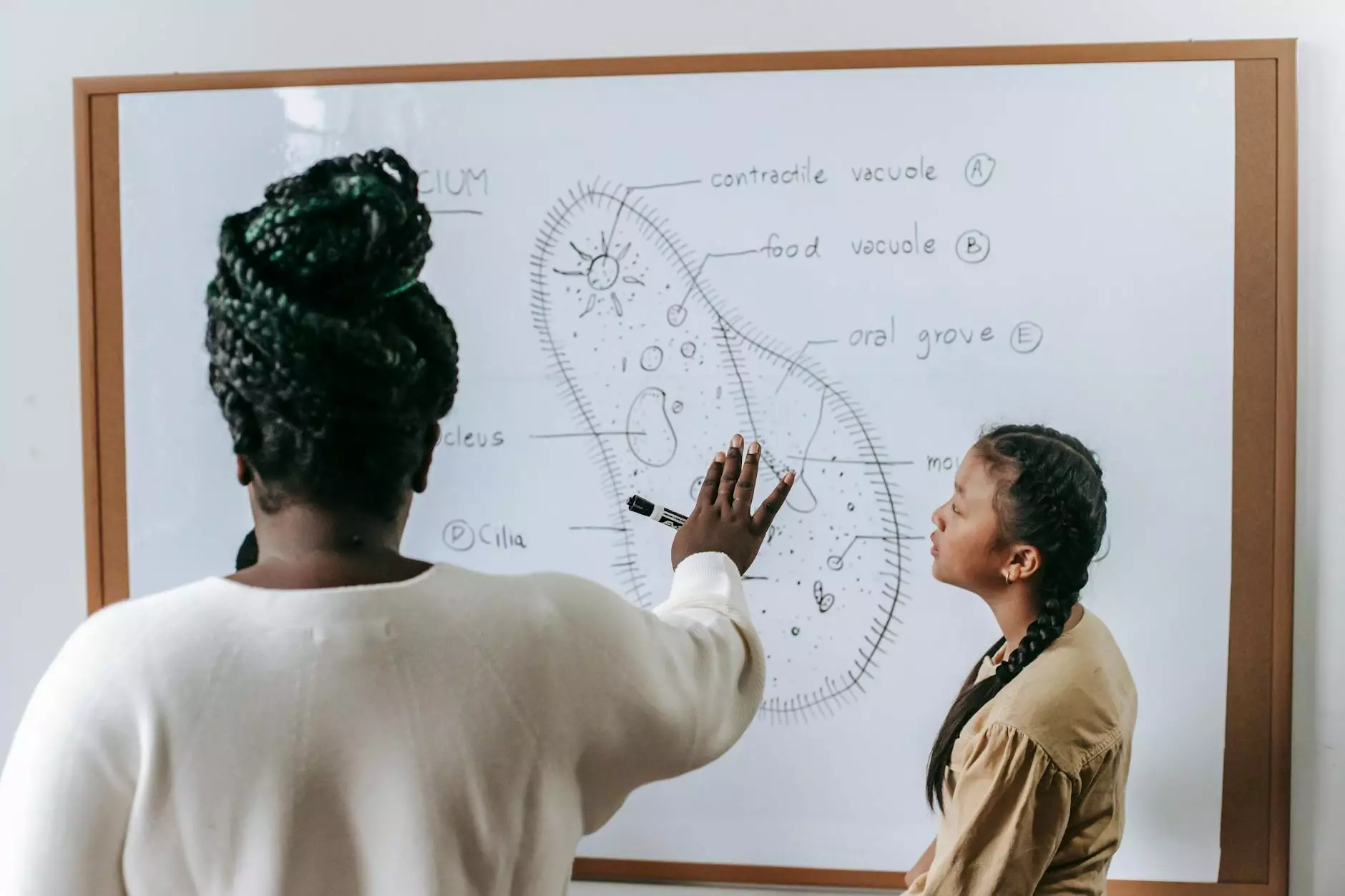
How to Write Coursework

Research Paper on Nestlé Company Sample

Five Tips How to Manage Workload - Studybay

Buy Essay Online: Original & Safe ᐉ Purchasing Essays papers

Calculating Copper Molar Mass - Studybay

Marketing Dissertation Help - Studybay

History Homework Help - Studybay

Valence Electrons: Definition, Configuration, Examples

Primer on the Construction of a Scary Story Essay
- 15 Great Observation Essay Topic Ideas You Should Not Miss
15 Observation Essay Topics & Tips Used to Write More Brilliant Papers

“Nothing has such power to broaden the mind as the ability to investigate systematically and all that comes under thy observation in life.” Marcus Aurelius
Every person faces various life situations when it is important to acquire information from a primary source to answer specific questions. Grab an observation essay example to see how experts arrange such information. Fact, observation, and inference are three words students should memorize. Writing a good observation essay makes a movie director out of the writer: he/she is focused on describing a particular experience using five senses:
Do you want your essay to make an imprint in the reader’s memory/leave an unforgettable impression? Buy an essay paper online from one of the best writing companies in the US!
What Is an Observation Essay and Its Purpose
Observation essay example of outline.
Read our unique guideline to have an observation essay example of outline!
You should face the problem discussed in your paper at least once in your life. To create a powerful observation essay, the author has to be a topic guru: describe what you survived or what inspires you.
Example: you decide to cover the topic of how safe it is to fly on a plane. It is not enough to take statistics and say it is the safest type of transport in the world without being the passenger. A good writer must share personal experience in order to support this claim. Attend a new restaurant before writing a review. Watch the latest movie before criticizing it in your work.
The planned experience involves taking notes, so carry a blank sheet of paper or mobile phone everywhere to write a part of what you wish to share. Leave the details for your first observation essay draft. Describe the entire process: from entering the restaurant and making an order to accepting the bill from the waiter. Conclude your impressions in the paper’s draft. Select several criteria to put a specific grade: quality of service, a variety of food, the location of the table, etc.
Each time your personal opinion changes (e.g., you order a different dish), write down these modifications. Put the events in a chronological order not to get confused. Ask your friends about the same restaurant to have a fuller picture before concluding.
Do not forget to obtain rights reserved once you’re done so that no one steals your words.
Write an Outline
To have a proper, logical paper structure, it is important to come up with an outline. Every time you get stuck, have a look at your observation essay plan to arrange the thoughts. You may change your final draft, but you must stick to the prepared outline. If your teacher requires, make a separate page with a detailed outline.
Do not hesitate to contact professional writing services in case you have problems with writing an outline or any other page.
1. Introduction
Wonder how to start off an essay ? Try to provide the reading audience with the unique opportunity to familiarize them with the described event/experience. Start with creating a sound hook sentence to catch your reader’s eyes. Share some background information to let the readers know why you have chosen the specific observation essay topics. Example: you discuss the political elections campaign; tell several words about the candidates and the general mood of the event. Write your thesis statement at the end of the paragraph. It will be the essay’s fundament.
How to start an observation essay
- shocking statistics
- interesting or unknown fact
- provocative question
- an anecdote
- a relevant quote. Avoid using trivial quotes. If you choose this option, use up-to-date ones, said by successful people of at least 20-21 century
- real- life example. This option usually works well. We recommend to use it to quotes..
2. Three-Paragraph Body
An observational essay has a body like any other type of academic assignment: research paper, article review, book report , etc. Teachers recommend developing a three-paragraph body with three powerful, supporting arguments. Arrange the notes according to your paper’s outline; add more details. Remember:
“Often it is tiny fragments which either make a picture convincing or incidental." Simone Bingemer
3. Concluding
Let's find out how to summarize an article . It is crucial to prevent your last paragraph from being wordy. Write a summary of the main points (arguments), restate your thesis sentence, and finish your paper with a call-to-action or another technique applied to leave powerful impressions. You may end with a rhetorical action, for example. Do not forget about the paper’s last page! The last page of an observation essay must contain a full bibliography list (list of references) to stress the author respects works with all rights reserved.
Proofread & Edit!
Want someone to check your final essay page by page? Place an order with the experienced online writing service, which serves college students around the English-speaking world!
Once you are done with your observation essay, do not hurry to submit your paper - there are several factors to check on every page:
- Spelling & Punctuation
Check whether the paper’s formatting corresponds to the instructor’s requirements; scan the final draft to see if it is 100% unique.
15 Most Effective Observation Essay Topics
Here is the list of observation essay topics to choose from:
- Thoughts on body piercing and tattoo
- Is tolerance important?
- Which video game may result in death?
- Significance of freedom and independence (Look at American Dream essay .)
- Meaning of money in modern world
- Sports develop leadership
- How I met my favorite movie star
- Is it dangerous to fly on the planes?
- Which book is worth reading at any age?
- New restaurant next-door
- The perfect birthday/wedding gift
- How must the word “honesty” be defined in dictionaries?
- Music as a great healing therapy
- How I personally became successful after writing the first page of my short story
- The qualities of true leaders based on people I met in my life
Type the essay title you like in Google search field to find a good observation essay example to use in your work.
Get Several Good Observation Essay Writing Tips
- Stay concise on the personal impression . Remember: the main goal of your personal paper is to ensure the reader’s experience will be enriched with your impressions.
- Get a notebook or mobile phone writing app to jot down every detail regarding your personal experience. A written word is more powerful than the one said before.
- Do not overload your observation essay with too many words ; try to avoid wordiness by ignoring transitional & introductory words (try to limit their usage). Structure your thesis statement clearly by selecting only the most important words on the chosen topic.
- Apply several examples related to your topic by describing several situations you faced during the entire life in details. It helps the readers to get a wider picture as well as share your personal experience.
- An observation essay has a lot of common features with the descriptive narrative. Studying descriptive writing will come in handy. Play with five human senses. Make sure every page of your paper makes the reader taste, hear, smell, see, and even touch your topic.
- No matter what place or subject you describe, try to remain objective in order to make the readers trust you .
- Do not forget to insert quotes from the reliable primary sources . Mention all works with rights reserved on the last page called Bibliography.
Remember: it is necessary to share lessons learned in order to highlight the importance of your selected topic. You can find excellent observation essay examples online. If you feel your observation essay lacks something, or you want a professional writer to proofread & edit your paper, feel free to order online academic assistance from one of the most credible companies.
Enrich your outlook by getting involved in something completely new. Share your personal experience in your own words!
More than 80% of students share they understand the topic better with the help of examples. Teachers who realize the power of visualization in learning try to involve images/videos in their lessons to explain the material in-depth. They may assign an illustration essay to teach this trick to their s...
Informative essay writing is an art that every student needs to master. In order to graduate from any educational establishment, one has to accomplish a lot of writing assignments successfully. Thus, essay writing skills are of utmost importance when it comes to student’s academic performance and gr...
Descriptive essay is one of the most popular types of academic writing for college, high school, and middle school students. The goal of writing a descriptive essay is to break down a certain thing, event, person, or phenomenon and provide its detailed description. A descriptive essay is a short pap...
Think of yourself as a member of a jury, listening to a lawyer who is presenting an opening argument. You'll want to know very soon whether the lawyer believes the accused to be guilty or not guilty, and how the lawyer plans to convince you. Readers of academic essays are like jury members: before they have read too far, they want to know what the essay argues as well as how the writer plans to make the argument. After reading your thesis statement, the reader should think, "This essay is going to try to convince me of something. I'm not convinced yet, but I'm interested to see how I might be."
An effective thesis cannot be answered with a simple "yes" or "no." A thesis is not a topic; nor is it a fact; nor is it an opinion. "Reasons for the fall of communism" is a topic. "Communism collapsed in Eastern Europe" is a fact known by educated people. "The fall of communism is the best thing that ever happened in Europe" is an opinion. (Superlatives like "the best" almost always lead to trouble. It's impossible to weigh every "thing" that ever happened in Europe. And what about the fall of Hitler? Couldn't that be "the best thing"?)
A good thesis has two parts. It should tell what you plan to argue, and it should "telegraph" how you plan to argue—that is, what particular support for your claim is going where in your essay.
Steps in Constructing a Thesis
First, analyze your primary sources. Look for tension, interest, ambiguity, controversy, and/or complication. Does the author contradict himself or herself? Is a point made and later reversed? What are the deeper implications of the author's argument? Figuring out the why to one or more of these questions, or to related questions, will put you on the path to developing a working thesis. (Without the why, you probably have only come up with an observation—that there are, for instance, many different metaphors in such-and-such a poem—which is not a thesis.)
Once you have a working thesis, write it down. There is nothing as frustrating as hitting on a great idea for a thesis, then forgetting it when you lose concentration. And by writing down your thesis you will be forced to think of it clearly, logically, and concisely. You probably will not be able to write out a final-draft version of your thesis the first time you try, but you'll get yourself on the right track by writing down what you have.
Keep your thesis prominent in your introduction. A good, standard place for your thesis statement is at the end of an introductory paragraph, especially in shorter (5-15 page) essays. Readers are used to finding theses there, so they automatically pay more attention when they read the last sentence of your introduction. Although this is not required in all academic essays, it is a good rule of thumb.
Anticipate the counterarguments. Once you have a working thesis, you should think about what might be said against it. This will help you to refine your thesis, and it will also make you think of the arguments that you'll need to refute later on in your essay. (Every argument has a counterargument. If yours doesn't, then it's not an argument—it may be a fact, or an opinion, but it is not an argument.)
This statement is on its way to being a thesis. However, it is too easy to imagine possible counterarguments. For example, a political observer might believe that Dukakis lost because he suffered from a "soft-on-crime" image. If you complicate your thesis by anticipating the counterargument, you'll strengthen your argument, as shown in the sentence below.
Some Caveats and Some Examples
A thesis is never a question. Readers of academic essays expect to have questions discussed, explored, or even answered. A question ("Why did communism collapse in Eastern Europe?") is not an argument, and without an argument, a thesis is dead in the water.
A thesis is never a list. "For political, economic, social and cultural reasons, communism collapsed in Eastern Europe" does a good job of "telegraphing" the reader what to expect in the essay—a section about political reasons, a section about economic reasons, a section about social reasons, and a section about cultural reasons. However, political, economic, social and cultural reasons are pretty much the only possible reasons why communism could collapse. This sentence lacks tension and doesn't advance an argument. Everyone knows that politics, economics, and culture are important.
A thesis should never be vague, combative or confrontational. An ineffective thesis would be, "Communism collapsed in Eastern Europe because communism is evil." This is hard to argue (evil from whose perspective? what does evil mean?) and it is likely to mark you as moralistic and judgmental rather than rational and thorough. It also may spark a defensive reaction from readers sympathetic to communism. If readers strongly disagree with you right off the bat, they may stop reading.
An effective thesis has a definable, arguable claim. "While cultural forces contributed to the collapse of communism in Eastern Europe, the disintegration of economies played the key role in driving its decline" is an effective thesis sentence that "telegraphs," so that the reader expects the essay to have a section about cultural forces and another about the disintegration of economies. This thesis makes a definite, arguable claim: that the disintegration of economies played a more important role than cultural forces in defeating communism in Eastern Europe. The reader would react to this statement by thinking, "Perhaps what the author says is true, but I am not convinced. I want to read further to see how the author argues this claim."
A thesis should be as clear and specific as possible. Avoid overused, general terms and abstractions. For example, "Communism collapsed in Eastern Europe because of the ruling elite's inability to address the economic concerns of the people" is more powerful than "Communism collapsed due to societal discontent."
Copyright 1999, Maxine Rodburg and The Tutors of the Writing Center at Harvard University
Calculate for all schools
Your chance of acceptance, your chancing factors, extracurriculars, ib extended essay tips.
I'm a junior in the IB Diploma Programme and working on my Extended Essay (EE) now. Any advice or tips to help me write a strong EE? What are some common pitfalls to avoid? I want to make sure I'm on the right track and maximizing my chances of getting a good score!
It's great that you're looking for advice to write a strong Extended Essay (EE). Here are some tips and common pitfalls to avoid to ensure you're on the right track:
1. Choose a subject and topic you're passionate about: Selecting a subject you are genuinely interested in will make the research and writing process more enjoyable and result in higher engagement throughout the project.
2. Frame a clear and focused research question: Avoid overly broad or vague research questions. A well-defined research question will provide direction and make it easier for you to stay on-topic.
3. Craft a detailed outline before starting to write: A detailed outline will help you organize your thoughts, structure your argument, and ensure that you address all elements of the research question.
4. Thoroughly research your topic: Investigate multiple perspectives, use diverse sources, and remember to critically evaluate the credibility of your sources. Make sure you have a good balance between primary and secondary sources, as this demonstrates a well-rounded research approach.
5. Analyze your findings, don't just describe them: The EE is an analysis-based project, not simply a regurgitation of established knowledge. It's crucial to discuss the significance of your research findings, synthesize the information, and draw meaningful conclusions.
6. Consistently cite your sources: Proper citation is essential to avoid plagiarism. Stick to your chosen citation style throughout and ensure you provide complete and accurate references.
7. Maintain an analytical and formal tone: The EE is an academic research paper, so make sure your language and tone are formal and professional. Cut out any informal language and focus on presenting a well-reasoned, evidence-based argument.
8. Edit and revise your work: This is a crucial step that many students overlook. Allocate time to proofread your work, revise for clarity and structure, and ensure that you've met the criteria set by the IB. Ask your supervisor for guidance throughout and have someone else review your work for feedback.
Some common pitfalls to avoid are:
- Procrastination: Start working on your EE early, and break the project into smaller, manageable tasks to prevent feeling overwhelmed.
- Lack of planning and organization: Keep track of your research, sources, and drafts from the beginning. This will save time and allow you to stay focused on your research question.
- Superficial analysis: Make sure your argument demonstrates a deep understanding of the topic rather than just summarizing information you gathered.
By following these tips and avoiding common pitfalls, you'll be well on your way to writing a strong Extended Essay and maximizing your chances of achieving a good score. Good luck!
About CollegeVine’s Expert FAQ
CollegeVine’s Q&A seeks to offer informed perspectives on commonly asked admissions questions. Every answer is refined and validated by our team of admissions experts to ensure it resonates with trusted knowledge in the field.

How to Write a Good Conclusion Paragraph (+30 Examples)
A good conclusion paragraph is the lasting impression you want to leave with your reader.
Here is a quick summary of how to write a good conclusion paragraph:
Write a good conclusion paragraph by summarizing key points, restating your thesis, and providing a final thought or call to action. Ensure it wraps up your main ideas, reinforces your argument, and leaves the reader with something to ponder.
This ultimate guide will walk you through the steps to craft an effective conclusion, along with 30 examples to inspire you.
5 Steps for Writing a Good Conclusion Paragraph

Table of Contents
There are five main steps to writing a good conclusion.
Let’s go through each step
1. Understand the Purpose
The conclusion is your final opportunity to leave an impact.
It should tie together your main ideas, reinforce your message, and give the reader a sense of closure.
Wrap Up Your Main Ideas
The conclusion should succinctly wrap up the main points of your writing. Think of it as a summary that captures the essence of your arguments without going into detailed explanations.
This helps reinforce what you have discussed and ensures that the reader remembers the core message.
Reinforce Your Thesis
Your thesis statement is the foundation of your writing.
In the conclusion, restate it in a new way to reinforce your central argument. This reminds the reader of the purpose of your writing and underscores its significance.
Give a Sense of Closure
A good conclusion gives a sense of closure to the reader. It signals that the discussion has come to an end and that all points have been addressed. This helps the reader feel that the piece is complete and that their time was well-spent.
Leave the Reader with Something to Think About
The best conclusions go beyond merely summarizing the content.
They leave the reader with a final thought or reflection that stays with them. This could be a call to action, a prediction about the future, or a thought-provoking question that encourages further reflection on the topic.
2. Summarize Key Points
Briefly summarize the key points discussed in the body of your text.
Avoid introducing new information. This helps the reader recall the main ideas.
Brief Summary
The summary should be concise and to the point. Highlight the main ideas discussed in your writing without going into detailed explanations. This helps refresh the reader’s memory of your key points.
Avoid New Information
Introducing new information in the conclusion can confuse the reader. The conclusion is not the place to present new arguments or data. Stick to summarizing what has already been discussed.
Recall Main Ideas
Summarizing the key points helps the reader recall the main ideas of your writing. This reinforces the message and ensures that the reader takes away the most important information from your piece.
“In conclusion, adopting sustainable practices, reducing waste, and promoting renewable energy are essential steps towards a greener future.”
3. Restate the Thesis
Restate your thesis in a new way. This reinforces your argument without sounding repetitive.
Restate, Don’t Repeat
Restating the thesis means expressing it in a new way.
Avoid repeating it verbatim.
Instead, rephrase it to reinforce your argument and show that you have successfully argued your point throughout the piece.
Reinforce the Argument
Restating the thesis helps reinforce your central argument. It reminds the reader of the purpose of your writing and underscores its significance.
Provide Closure Restating the thesis in the conclusion gives a sense of closure.
It signals that the discussion has come full circle and that you have addressed your initial argument.
“By implementing these strategies, we can significantly reduce our carbon footprint and protect our planet for future generations.”
4. Provide a Final Thought
Offer a final thought or reflection to leave a lasting impression. This could be a call to action, a prediction, or a thought-provoking question.
Final Thought or Reflection
A final thought or reflection can leave a lasting impression on the reader.
It shows that you are not just summarizing your points but also offering a deeper insight or perspective.
Call to Action
A call to action encourages the reader to take the next step.
It motivates them to act based on the information or arguments presented in your writing.
Prediction or Question
A prediction about the future or a thought-provoking question can engage the reader and encourage further reflection. This leaves the reader with something to think about even after they have finished reading.
“As we move forward, it’s crucial to remember that every small effort counts. Together, we can make a difference.”
5. Use a Call to Action (if applicable)
If your piece is meant to persuade or encourage action, include a call to action. This motivates the reader to take the next step.
Motivate the Reader
A call to action motivates the reader to take the next step.
It encourages them to act based on the information or arguments presented in your writing.
Encourage Action
Including a call to action is especially important in persuasive writing. It encourages the reader to act on the information provided and make a change or take a specific action.
Provide Clear Steps
A good call to action provides clear steps for the reader to follow.
It should be specific and actionable, guiding the reader on what to do next.
“Join us in making a positive change. Start today by reducing your plastic use and spreading awareness about environmental conservation.”
Check out this video about how to write a good conclusion:
How to Write a Good Conclusion for an Essay
Writing a good conclusion for an essay involves summarizing your main points, restating your thesis, and providing a final thought or reflection.
Here’s how:
- Summarize Main Points : Briefly recap the key points discussed in the body of your essay.
- Restate Thesis : Paraphrase your thesis statement to reinforce your argument.
- Final Thought : Offer a final insight, question, or call to action to leave a lasting impression.
This approach ensures your essay feels complete and leaves the reader with a clear understanding of your argument.
How to Write a Good Conclusion for an Argumentative Essay
A strong conclusion for an argumentative essay should not only summarize the main points and restate the thesis but also emphasize the importance of your argument.
Follow these steps:
- Summarize Arguments : Briefly outline the main arguments presented.
- Restate Thesis : Rephrase your thesis to highlight its significance.
- Address Counterarguments : Acknowledge opposing viewpoints and reinforce why your argument is stronger.
- Call to Action : Encourage the reader to take action or reconsider their position.
How to Write a Good Conclusion for a Research Paper
Crafting a good conclusion for a research paper involves summarizing your findings, discussing their implications, and suggesting future research.
Here’s a guide:
- Summarize Findings : Recap the key results of your research.
- Discuss Implications : Explain the significance of your findings and how they contribute to the field.
- Restate Research Question : Reiterate the research question and how your findings address it.
- Suggest Future Research : Propose areas for further investigation.
This format provides a comprehensive and thoughtful conclusion that underscores the importance of your research and its potential impact.
30 Examples of Good Conclusion Paragraphs
Let’s explore some good examples of good conclusions.
Example 1: Environmental Essay
“In conclusion, the preservation of our natural resources is not just a necessity but a responsibility we owe to future generations. By taking small steps today, we can ensure a healthier planet tomorrow.”
Example 2: Technology Article
“As we embrace the advancements in technology, it is vital to remain vigilant about privacy and security. Staying informed and proactive can help us navigate the digital landscape safely.”
Example 3: Health and Wellness Blog
“Ultimately, achieving a balanced lifestyle requires dedication and mindfulness. By prioritizing our well-being, we can lead healthier and more fulfilling lives.”
Example 4: Business Report
“In summary, the market analysis indicates a positive trend for our product. With strategic planning and execution, we can capitalize on these opportunities and drive growth.”
Example 5: Education Essay
“In the end, fostering a love for learning in students is the key to their success. By creating engaging and supportive educational environments, we can inspire the next generation of leaders.”
Example 6: Travel Blog
“To conclude, exploring new destinations enriches our lives and broadens our perspectives. Embrace the adventure and discover the beauty of our world.”
Example 7: Personal Development Article
“In the final analysis, personal growth is a lifelong journey. Embrace challenges, learn from experiences, and continue striving to become the best version of yourself.”
Example 8: Marketing Case Study
“In closing, the data clearly shows that targeted marketing strategies significantly improve customer engagement and sales. By refining our approach, we can achieve even greater success.”
Example 9: Historical Analysis
“In conclusion, the events of the past continue to shape our present and future. Understanding history is essential to making informed decisions and avoiding past mistakes.”
Example 10: Scientific Research Paper
“Ultimately, the findings of this study contribute to our understanding of the subject and open the door for further research. Continued exploration in this field is vital for advancing knowledge.”
Example 11: Political Commentary
“In the end, civic engagement is crucial for a functioning democracy. Stay informed, participate in discussions, and exercise your right to vote.”
Example 12: Fashion Blog
“To wrap up, fashion is a powerful form of self-expression. Embrace your unique style and let your wardrobe reflect your personality.”
Example 13: Food Blog
“In conclusion, cooking at home not only saves money but also allows you to experiment with flavors and ingredients. Start your culinary journey today and discover the joys of homemade meals.”
Example 14: Sports Article
“Ultimately, teamwork and perseverance are the foundations of success in sports. Keep pushing your limits and strive for excellence on and off the field.”
Example 15: Literature Analysis
“In summary, the themes explored in this novel resonate with readers and offer valuable insights into the human condition. Its timeless message continues to inspire and provoke thought.”
Example 16: Parenting Blog
“In the end, raising children requires patience, love, and commitment. Cherish the moments, and remember that every effort you make shapes their future.”
Example 17: Finance Article
“To conclude, financial planning is essential for securing your future. Start today by setting clear goals and creating a budget that aligns with your aspirations.”
Example 18: Career Advice Blog
“In conclusion, building a successful career takes time and dedication. Stay focused, seek opportunities for growth, and never stop learning.”
Example 19: Fitness Blog
“Ultimately, regular exercise and a balanced diet are key to maintaining a healthy lifestyle. Stay motivated, and remember that every step counts towards your fitness goals.”
Example 20: DIY Blog
“In summary, DIY projects are a rewarding way to personalize your space and learn new skills. Get creative and start your next project today.”
Example 21: Relationship Advice
“In the end, strong relationships are built on communication, trust, and mutual respect. Nurture your connections and strive for harmony in your interactions.”
Example 22: Pet Care Blog
“To wrap up, responsible pet ownership involves understanding your pet’s needs and providing them with a loving home. Invest in their well-being, and they’ll reward you with unconditional love.”
Example 23: Environmental Science Paper
“In conclusion, addressing climate change requires global cooperation and immediate action. Every effort counts, and together we can create a sustainable future.”
Example 24: Technology Review
“Ultimately, this gadget offers impressive features that enhance convenience and efficiency. Consider it for your next tech upgrade.”
Example 25: Psychology Article
“In summary, understanding human behavior is crucial for improving mental health and well-being. Continue exploring this fascinating field for more insights.”
Example 26: Gardening Blog
“In the end, gardening is a therapeutic and rewarding hobby that connects us with nature. Start your garden today and enjoy the benefits of fresh produce and beautiful blooms.”
Example 27: Home Improvement Article
“To conclude, home improvement projects can significantly enhance your living space and increase property value. Plan carefully and enjoy the transformation.”
Example 28: Social Media Marketing
“In conclusion, effective social media marketing requires consistency, creativity, and engagement. Develop a strategy that resonates with your audience and watch your brand grow.”
Example 29: Automotive Review
“Ultimately, this vehicle combines performance, style, and safety. Take it for a test drive and experience its capabilities firsthand.”
Example 30: Music Blog
“In summary, music has the power to evoke emotions and bring people together. Explore different genres and find the soundtrack to your life.”
Tips for Writing a Strong Conclusion
Here are some simple but good tips for writing a powerful conclusion:
- Keep it Concise – A good conclusion should be short and to the point. Avoid unnecessary details and focus on wrapping up your main ideas.
- Use Clear Language – Ensure your language is clear and easy to understand. Avoid jargon and complex sentences.
- Be Consistent – Maintain the same tone and style as the rest of your text. Consistency helps create a seamless reading experience.
- End on a Positive Note – Whenever possible, end with a positive or uplifting message. This leaves the reader with a good impression.
Common Mistakes to Avoid
There are some common mistakes that many writers make when crafting their conclusions.
- Introducing New Information – Don’t introduce new ideas or arguments in the conclusion. This can confuse the reader and dilute your main points.
- Being Vague – Avoid vague statements that don’t add value. Be specific and clear in your summary.
- Repetitiveness – Don’t repeat the same points over and over. Restate your thesis and key points in a new way.
- Ignoring the Thesis – Make sure to tie your conclusion back to your thesis. This reinforces your argument and gives a sense of closure.
Final Thoughts: How to Write a Good Conclusion Paragraph
Writing a good conclusion paragraph is essential for creating a cohesive and impactful piece of writing.
By summarizing key points, restating the thesis, providing a final thought, and using a call to action, you can craft a strong conclusion that leaves a lasting impression.
Use the 30 examples provided to inspire your own writing and ensure your conclusions are always effective and engaging.
Read This Next:
- How to Write an Introduction Paragraph [50+ Examples]
- How to Write a Paragraph [Ultimate Guide + Examples]
- Types of Evidence in Writing [Ultimate Guide + Examples]
- Narrative Writing Graphic Organizer [Guide + Free Templates]
- How to Write a Hook (40 Good Examples)
- Essay Editor
Good Writing, Its Importance and Principles Essay
1. introduction.
After the spoken language, writing is the most important medium of expressing thoughts, feelings, observations, and experiences. Writing is a powerful tool in those fields where its direct observation and study are not always possible, and it is especially important in recording the results of scientific experiments. The written communication shapes attitudes and beliefs and introduces knowledge and ideas. It is said that a writer may perhaps not be able to change the world, but his words may serve as a source of initiation to those who have the power to act. The most common reason for failing to write is fear, the fear of being rejected for what one has written. This fear leads writers to all kinds of evasions. Some never try to write at all, others write slowly but not too well, and finally, some produce reams of excellent writing but never accept the proof of their competence. Consequently, the important thing to remember is that a capable writer communicates just as well on paper his good ideas as he does standing before an audience. Writing, like speaking, is a skill which all students can develop with some training. The students who succeed are those who truly enjoy the challenge and magic of good writing.
2. The Importance of Good Writing
Professional papers, letters, reports, briefs, abstracts, and breaking news "have something to say". They are organized for the reader's immediate perception of message relevance to his needs. They develop natural focal points that come from, and coalesce in, emphasis on main ideas and necessary detail. Professionals share with one another not only acknowledgment of the immense difficulty of writing but also the hard work of rewriting. They want to communicate well; that determination brings them allies of content, order, conciseness, simplicity, and force. Their writing seeks to say what needs to be said and to say it well. This aim is the essence of style in the professions. The fifth edition of this book, like its predecessors and like the growing number of professional communications courses, is explicit. This is the mark of a generation's progress: increasing recognition that verbal skills are a professional, not a supporting, activity. Both students and practitioners come to professional communications courses rated among the most valuable they have experienced in their specialized education. In them, people develop powers— powers clearly and concretely applicable to their professional work. Each new acquaintance with the fundamental aspects of style and the functions of sentence development, paragraphing, and presentation is yet another encouraging beginning of progress toward effective professional writing. Meeting their interests, the book is not simply an "elementary" exposition, addressed to the needs of immature students. It is, rather, about the basic principles of style in professional writing— those guidelines that can enable students and practitioners to tell the truth-in-complexity as effectively and reliably as they know it. This fifth edition adds yet more explicit references to common uses of graphics and computers in documents, lending increased importance to subjects long recognized here. There is also new material and some re-orders of successive units so as to serve better the overall progression of the development of a writing course for whatever your need.
2.1. Effective Communication
Clear and precise language is a foundation for good writing and effective communication. Good use of language directs the reader to consider the message rather than the tone that delivers the message. Much of the writing we must review or prepare relates to the development or evaluation of carefully considered arguments or the analysis of information. Regardless of our goal, good writing is essential to the success of these endeavors. Moreover, good writing is not reserved for the brilliant few. By practicing the following rules, you will learn to write clearly for any purpose. Be clear. Be direct and concise. Use the most appropriate word; do not use ten words when one will make your point. Wordy writing is difficult to follow. Readers are more likely to grasp your meaning if you can be succinct. The wordier the writing, the more confusing. Short and simple explanations are difficult to miss or misunderstand. Stay on course to avoid ambiguous leads that may create confusion. After writing, read for clarity. Ensure that your intentions shine through your text. If you do not understand what you wrote, no one else will either. Your writing is vital to achieving your goals. The clearer you are, the easier it is for your audience to understand and then to help you to respond to your argument or analysis.
2.2. Professionalism and Credibility
If you're writing for a business, it's important to project a professional image. Many people form the first impressions of you or your company based on the quality of the writing they see. If it's full of misspelled words, grammatical gaffes, and awkward sentences, your image is suffering. But if your messages are positive, clear, and polished, your professional image improves. All business professionals need to communicate effectively, and good writing skills can help you get ahead. The importance of good writing was summarized by one of America's finer journalists, George F. Will: "Newspapering is much like life itself. It is disorder rendered tolerable by an inherited grammar and a self-imposed one. Knowing where the verb needs to go or the source of a quotation needs to be has nothing to do with knowledge and everything to do with character. The former is available to any intelligent person; the latter is only intermittently found among the persons who practice a peculiarly disorderly craft." One of the basics in writing is that words easily misspelled should never appear in final drafts. Your writing will have more credibility if it "flows" smoothly, if it "sounds" authoritative. Always strive to deal with objections before they are raised; anticipate the questions a reader is likely to ask, and incorporate the answers in your writing. If you ever lack confidence, your credibility is destroyed, so always avoid making self-disparaging remarks about your work. From the author's desk.
3. Principles of Good Writing
Three principles for good writing are economy, communication, and personality. Write quickly and briefly, without excess words or detail. However, avoid stilted language or abbreviated words unsuitable for your subject and audience. To achieve these goals, say exactly what you mean; use the vocabulary and idioms that best communicate your meaning. Full, direct expression of your personality and world view adds an unmistakable label to whatever you write, explaining largely why books are sold by author names. It's impossible to appeal to all readers, so limit your subject matter while making your strongest points. Indeed, happy writing is much like composing a know-it-all letter of resignation. The key to success is insufficient time. If possible, instead of writing a book, write three and pick the best one. Good writing is worth the time and effort it demands, and demand it does. Without strenuous revision, your first effort is likely to express your thoughts poorly and to cause concepts to follow sentences rather than virtues. Organization, the hierarchical presentation of ideas with increasing or decreasing levels of importance, will occur to you as you proceed, thereby complicating the revisability of the initial form. As you attempt to break up homogeneous expanses of text by introducing itemizations and elaborations, you may have to consider recommunicating your meaning to page layout specialists, print device manufacturers, and telecommunications protocol designers. Finally, hygiene, the stylistic and grammatical aspects of your writing, must be considered continuously throughout the writing process. Good writing is difficult to achieve, but practicable by almost anyone.
3.1. Clarity and Conciseness
1. Clarity and conciseness: As you write, you produce new language, and the potential for misunderstanding is always present. Your task is to make sure that the message you have in you is the message that the reader gets. For this task, clear writing and clear organization are your most important tools. Particularly in technical writing, you are also expected to be concise. So the message is simple: Say what you mean, and say it as clearly and simply as you can. Assume that the reader is trying to understand you rather than trying to misunderstand you. 2. Your choice of words is the primary tool of clarity. Your choice of sentence structure and the overall organization are your primary tools of conciseness. Sometimes you can achieve conciseness just by being economical and disciplined in your choice and use of words. Replace "On the occasion of" with "On" or "During," "In connection with" with "Against" or "About," "In the interests of" with "For," and "In order to" with "To." Say "This book tells you what you need to know" instead of "This book serves the need for instruction on the central concepts of decimal arithmetic" or "This guide shows you the most important parts of the process." If you think about words like this, you can make your language clear and concise at the same time.
3.2. Grammar and Syntax
Because correct grammar and syntax contribute to effective writing, one must recognize the rules behind these structures and strive to obey them. Every language has its own rules and peculiarities. Consequently, everyone who uses a language seriously needs to understand that language in order to communicate most effectively. Without that understanding, personal expression and the exchange of ideas will remain unorganized and confusing. Once a person understands the basic rules of grammar, his attempts to write become easier and simpler. He can then write more efficiently. The grammars of every language have many detailed rules. Examples from other languages help demonstrate this principle. Each language belongs to a family of languages. English is in the Germanic family. Germanic rules help explain the disposition of words within an English sentence. The English language allows for nouns, verbs, adjectives, adverbs, pronouns, prepositions, conjunctions, and interjections. Within a standard English sentence, a subject, action, and object are common. The heaviest ideas in English are generally at the conclusion of a sentence or paragraph. When such ideas cannot be delivered at the end, the sentence or paragraph is restructured to place the emphasis where it belongs. The standard English sentence is comprised of three or four parts, presented in a string of words. However, these rules are only applicable to nitpickers of the English language. Everyone who writes should look to the classical standards as benchmarks of excellence. Good writers never rebel against them. Instead, they try to understand the classical rules and maintain them as much as possible while they are writing.
3.3. Organization and Structure
The basic parts of speech have various components, levels, and relationships. The largest component is meaning: words carry meaning, and the arrangement and relationship of these words is meaningful. Words are grouped by their level of analysis: sentence, phrase, and word. A sentence is composed of three major features: a subject, a predicate, and, as necessary, an object. The subject expresses, usually in a noun phrase, who or what carries out the action. The predicate is a verb with an object, if necessary, plus extra information about the subject, or the phrase covers the time, aspect, mood, and voice associated with the action. The object is optional, but when used, it affects the meaning of the verb. Other modifiers or basic sentence structures include (in elaborate sentences): the subject, relative clause, and object. Variations in phrase or word distribution and relationship introduce additional complexity. Clause complements work to complete the basic meaning of verbs and expressive phrases when their complements are missing. That is, each verb contains the potential for added meaning described by the relationship; the basic word is very little. Two types of clause complements exist: object complements and subject complements (linking verbs). The last kind of word level relationship we will cover brings us in contact with specific sentence building rules. Types of modifiers do not upset the basic sentence structure; rather, they work on the margins, like a frame around a picture or a dust jacket on a book. The primary function of prepositional phrases depends on where a speaker or writer places them. In the placement of prepositional phrase, the writer contributes to smooth logical flow while also helping to inform the reader about the relationship of words and ideas. By properly constructing and placing the dozen or so sentence types in the text, the writer achieves grammatical syntax within the English language.
4. Conclusion
In sum, you cannot just sit down and dash off a good text; you need to commit time, structuring it. Furthermore, if you wish to optimize your readers' needs, their communication and enthusiasm for what you have to say, and ultimately your results, you have to write well. Achieving all this requires vision and skill - as well as knowledge of the trajectory you're executing, in this case your research. Strong writing forms sound manuscripts, so scientists need to exercise the words as much as their thoughts. They must, therefore, be discriminating and resourceful to promote both their ideas and their manuscripts. Only there is a continuous high standard of writing, should journals invest strategy editorial resources. Ultimately, striving to write effectively can stimulate an optimistic, interactive virtues cycle, inspiring you to work harder in planning, research, and finalizing, as well as the pleasure of tailoring ideas to an audience to be shared with. Taking all these aspects into account, not just formulaic boxes to be marked, will help both to raise the quality of natural science writing and some of the important natural questions.
Related articles
Classroom dynamics and its effect on learning.
1. Introduction The primary goal of education is learning, a goal that is influenced by a variety of factors encompassing human cognitive processes. These factors can be classified into pedagogical and psychological, the former residing in the field of instructional training, while the latter lies within the realm of cognitive psychology. Explaining the success or failure in learning is an essential issue for both disciplines. This explanation may be more successful if a combination of their fi ...
Dentists, How They Can Help in Society Report
1. Introduction People are becoming increasingly aware of the interconnectedness of our lives and of the role of each individual in contributing to the well-being of society. This is particularly the case in the professions that deal with the citizens of the country, the most personal of which is health care, especially that of general practitioners who are responsible for total patient health. The profession of dentistry, which is concerned with the care of the oral cavity in which diseases fr ...
Empowerment of Students for Their Motivation
1. Introduction At present, in our country, there is an important demand for changing the paradigm when the teaching-learning process at the university is also renovated. The previous traditional model was seen from an intermediate level with the needs of society and the students. Besides, the university was seen as a calm institution focused more on the academy with minor connection with the society and its own members. The teachers, in turn, had greater leisure and possibility for authority i ...
Teaching Profession
1. Introduction Teaching has long been considered the mother of all professions. Society has looked to the bearer of knowledge as one responsible for the preparation of the future caretakers of that society. As the evolution of the teaching professional has occurred over time, there have been many interpretations and expectations, but most have agreed that the teaching profession is a public office with a moral and knowledge base charged with the responsibility for the world's most important ci ...
Communication Process during the Interview
1. Introduction to Interview Communication An interview is an effective way to determine how well a candidate matches the needs of a job and how well they will fit the organization. Clearly, this is important to both the job seeker and the employer. The selection of employees is probably the most significant responsibility a manager has, yet many are never formally trained in conducting effective and efficient interviews. The ability to communicate effectively and efficiently does not appear au ...
The Development of Present Skills for the Future
1. Introduction The objective of this special issue is to deepen our understanding of how to develop the skills needed for the global workforce in the 21st century. The 21st century-specific skills were first emphasized by the U.S. National Research Council, who identified six key areas: cognitive skills, interpersonal skills, intrapersonal skills, adaptability, communication, and learning in formal and informal methods. These skills are necessary not only for all people but also for developmen ...
Watching TV Makes Us Smarter
1. Introduction Television is a relatively new medium of commercial communication that requires specific research. The growth of its ability in the postwar period and its pervasive impact make this a matter of broad concern. The excitement of the new information, communication, learning, and entertainment media is balanced by a range of concerns: that it affects the development of childhood relations and thus becomes an agent of socialization; that it initiates, affirms, and shapes distinctions ...
In the Basement of the Ivory Tower
1. Introduction A critical examination of higher education in the 21st century can hardly overlook neoliberalism and managerialism, the hallmarks of the contemporary architecture of the economic and social order. Higher education systems are becoming increasingly wrapped up with the needs of an advanced capitalism, and that acquires diverse but coherent forms and guises, including sensitization to competition, focus on efficiency and performance, and a specific attention to market needs. This r ...

IMAGES
VIDEO
COMMENTS
Key Takeaways: Write in the present tense to establish a sense of immediacy and connection to the event. Structure your essay with an introduction, body paragraphs, and a conclusion. Include a hook, background information, and a clear thesis statement in your introduction. Develop your thesis statement with arguments and facts in the body ...
It's where you choose your subject, conduct your observation, and gather your notes. This stage is crucial as it sets the foundation for your observation essay. By investing time and thought into this preparatory phase, you can ensure a smoother, more effective writing process. 1. Choose a Subject for Observation.
The first step in taking field notes of your observation is, write down the necessary details of the subject. Also, you should include the time and place. In writing your findings, you should stay objective and factual. Also, don't forget to write a description of the setting and the materials involved. The readers of your observation essay ...
In your observation essay conclusion, you must rephrase and restate your thesis statement and then describe your overall impression regarding the process of observation and the event or the subject that you have been observing. Again, there is no need to make any strong statements, just tell the reader that you enjoyed making an observation ...
1. First-person narration. Surprisingly, this type of academic writing allows first-person narration. The main purpose is to give your readers a feeling that your memory is actually theirs. The words "I," "my," and "mine" become your best friends when you write an observation essay. 2.
The observation process starts with focused questions. Be prepared to observe your subject with a list of focused questions. Don't show up with a few scrap pieces of paper and a pen, thinking you're ready to get to work. This lack of preparation will likely mean that you'll just start writing down everything you see.
Write an observation essay outline if you are stuck with no idea how to start. Include the details like the number of paragraphs, specify headings, create a thesis statement, highlight main points and issues to cover. It is always a good idea to break down your task into pieces when working on the essay template .
Observation, inference and fact are the three concepts every student that wants to write a good observation essay has to memorize. The ability to write a good observation essay makes the difference between a writer and a true wizard of words. And in order to achieve such a state you need to make use of all the senses available to you:
An observation essay is one that aims to give the reader the clearest possible sensory image of an event or circumstance. The observation essay can be focused on one particular thing, such as an object of which the writer wants to capture details, or it can be about a time and/or place to which the writer would like to transport the reader. The key to an observation essay is precise sensory ...
Learning how to start an observation essay can make the difference between working on the paper for 4 days and finishing it in just 2. Here is how you write an observation essay in just 5 paragraphs: ... When it comes to writing an observation essay, there is nothing better than a good essay outline. Really, an outline will prove invaluable ...
Take Detailed Notes: During your observation, take clear and concise notes. Include specific actions, conversations, body language, and any other relevant information. Stay Objective: Strive to maintain objectivity during your observation. Avoid making assumptions or judgments based on your personal beliefs or biases.
Observation Papers. Writing a qualitative observation paper entails three processes. First, you record your observations of a particular setting or situation‐‐that is, take field notes. Next, you interpret those notes according to relevant criteria. Finally, you write a well organized paper that presents your observations and ...
Introduction of observation essay should take about 15-20 percent of the entire work. This amount of words must be enough to make the reader want to read your narration and know you better. Using a quote of a famous person may also be used as catchy element of the introduction.
Observation essay example #1: A Report on a Child Observation Project in a Preschool Class. A Report on Child Observation Project in a Preschool Class. Introduction. For this project, I observed my mother's preschool class for three hours, and three kids that she baby-sits on weekends for three hours.
A good observation essay makes an imprint in the memory of the reader and becomes his own experience destroying the borderline between real and read experiences. Observation essay Outline This rubric is a condensed treatment of the Observation essay writing, this Outline is just a description of the main facts and rules about how to write this ...
Troy Holmes. An observation essay is a paper written after watching a person, group, or event. This essay is typically written in the first person as an account of historical events witnessed by the writer. It provides a detailed descriptive account of an event or activity and should include a detailed account of theme, mood, and scenery.
An observational study is used to answer a research question based purely on what the researcher observes. There is no interference or manipulation of the research subjects, and no control and treatment groups. These studies are often qualitative in nature and can be used for both exploratory and explanatory research purposes.
This will help ensure that your observation is well-organized and focused. 3. Be Objective and Unbiased. When conducting your observation, strive to remain objective and unbiased. Avoid making assumptions, and let the data speak for itself. Record your observations accurately and truthfully. 4.
2. Three-Paragraph Body. An observational essay has a body like any other type of academic assignment: research paper, article review, book report, etc. Teachers recommend developing a three-paragraph body with three powerful, supporting arguments. Arrange the notes according to your paper's outline; add more details.
A good thesis has two parts. It should tell what you plan to argue, and it should "telegraph" how you plan to argue—that is, what particular support for your claim is going where in your essay. Steps in Constructing a Thesis. First, analyze your primary sources. Look for tension, interest, ambiguity, controversy, and/or complication.
Step 1: Return to your thesis. To begin your conclusion, signal that the essay is coming to an end by returning to your overall argument. Don't just repeat your thesis statement —instead, try to rephrase your argument in a way that shows how it has been developed since the introduction. Example: Returning to the thesis.
A good observation describes the interaction that is taking place between the child and either another child, an adult or an object. The description doesn't need to be long and cumbersome, but should paint a picture of the interaction that is occurring with that child. Using the child's voice is a great way to show how the child has engaged ...
Now, using this essay writing guide, let's explore how to create a well-structured introduction in ten steps. Each step is crucial in writing an essay introduction that captures attention and presents the thesis. Start with a hook: Begin with something that is engaging. Use a startling fact, a quote from a well-known figure, or a riveting ...
The first two are good examples, along with commentary on what makes them strong and what these authors might improve upon to make them even better. The third essay is an exceptionally poor one, designed to help you see common pitfalls within this essay genre so you can think about how to avoid them yourself (or even how to correct mistakes you ...
The scientific method is an empirical method for acquiring knowledge that has characterized the development of science since at least the 17th century. The scientific method involves careful observation coupled with rigorous scepticism, because cognitive assumptions can distort the interpretation of the observation.Scientific inquiry includes creating a hypothesis through inductive reasoning ...
It's great that you're looking for advice to write a strong Extended Essay (EE). Here are some tips and common pitfalls to avoid to ensure you're on the right track: 1. Choose a subject and topic you're passionate about: Selecting a subject you are genuinely interested in will make the research and writing process more enjoyable and result in higher engagement throughout the project.
Let's go through each step. 1. Understand the Purpose. The conclusion is your final opportunity to leave an impact. It should tie together your main ideas, reinforce your message, and give the reader a sense of closure. Wrap Up Your Main Ideas. The conclusion should succinctly wrap up the main points of your writing.
Essay on Court Observation. This essay sample was donated by a student to help the academic community. Papers provided by EduBirdie writers usually outdo students' samples. The proceeding I observed was a continuation of a trial. It was on November 1st, the courthouse was Robert S.K. Welch Court House and the trial was for the case R. v R.C ...
1. Introduction After the spoken language, writing is the most important medium of expressing thoughts, feelings, observations, and experiences. Writing is a powerful tool in those fields where its direct observation and study are not always possible, and it is especially important in recording the results of scientific experiments. The written communication shapes attitudes and beliefs and ...